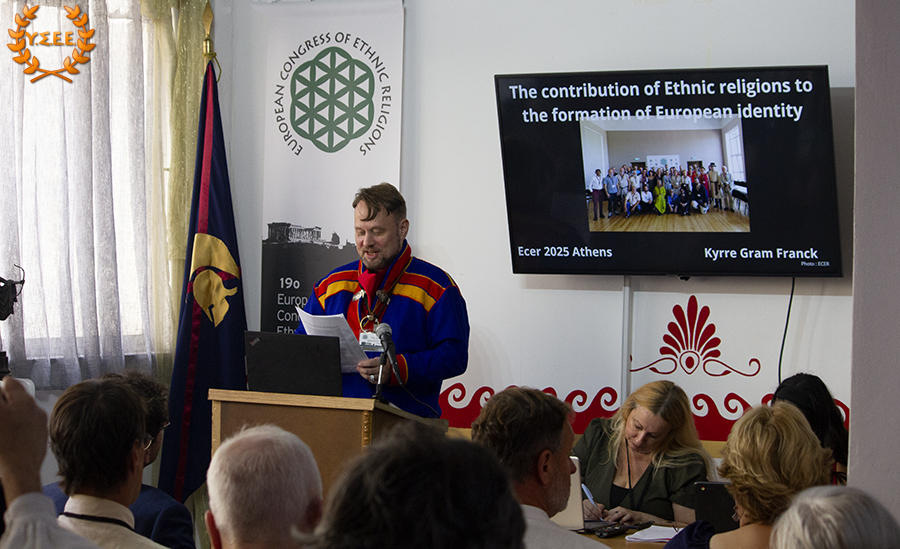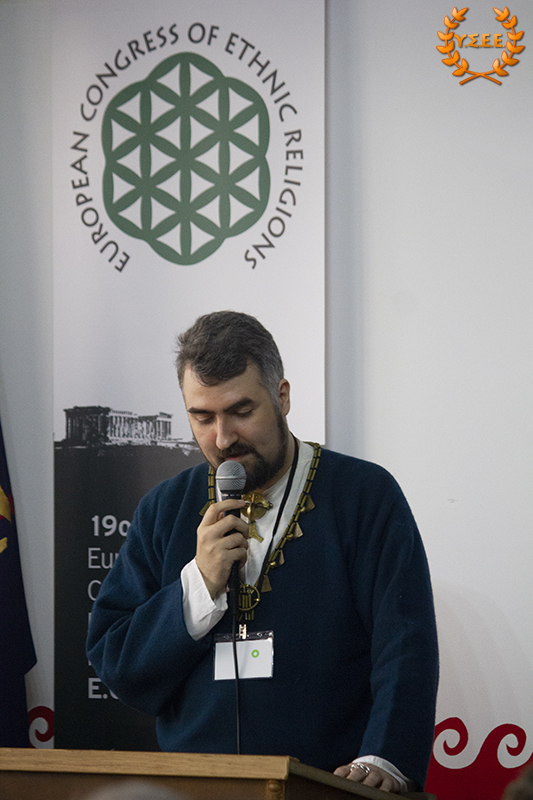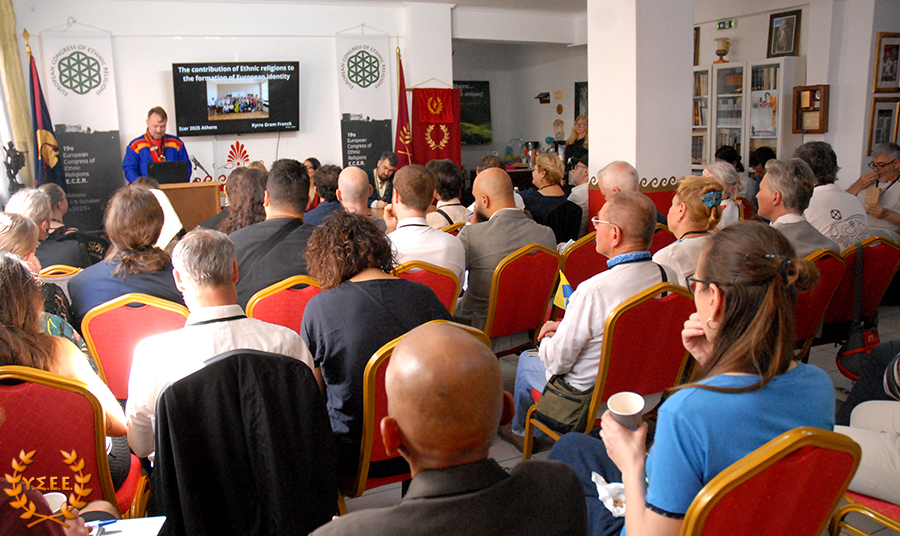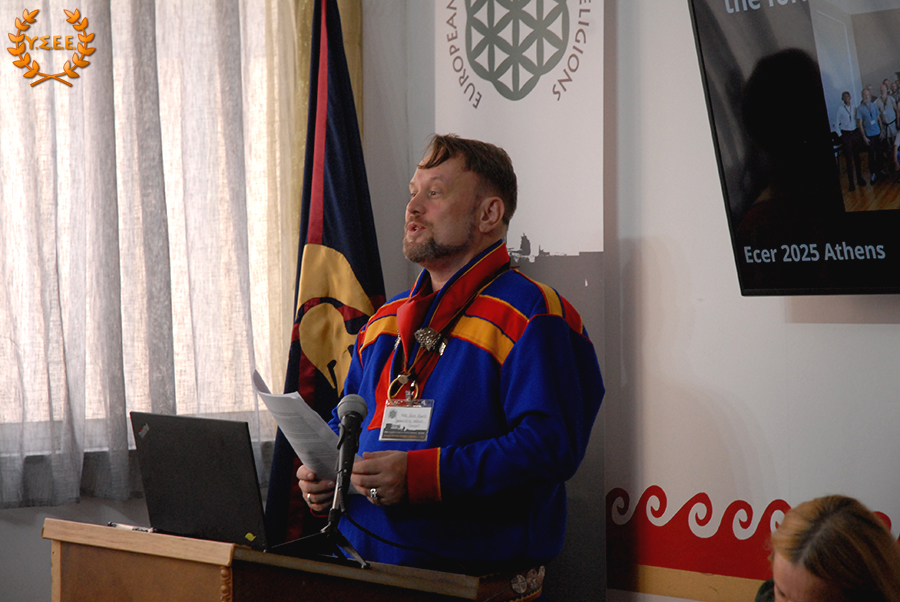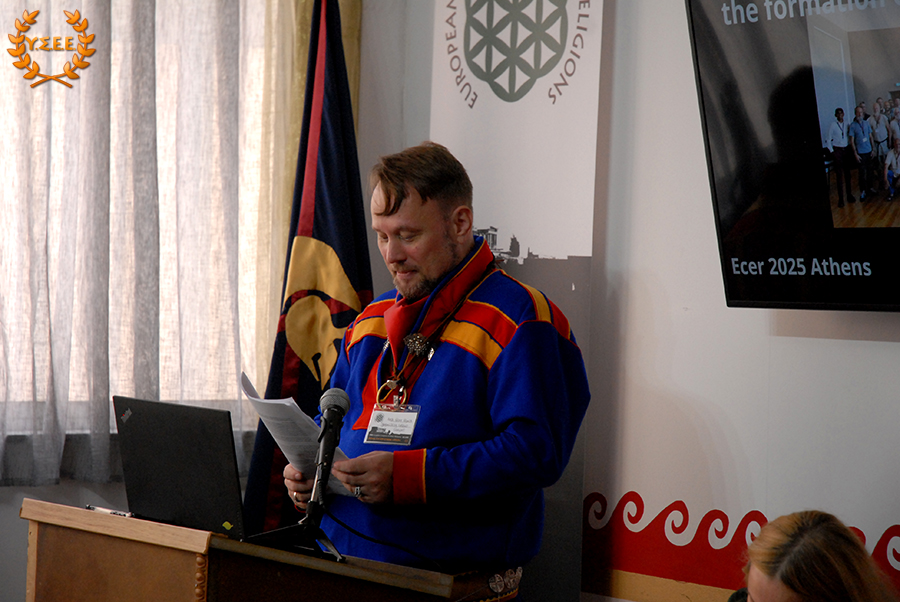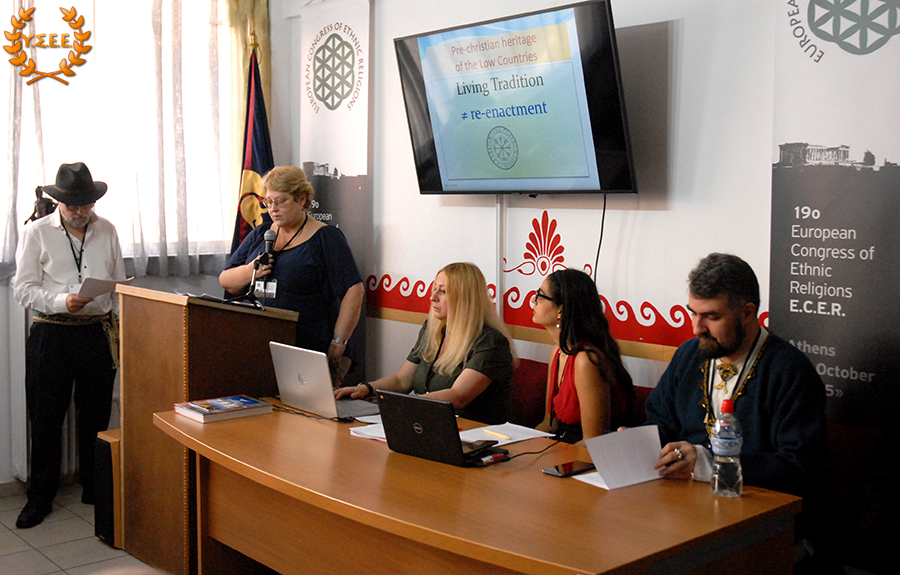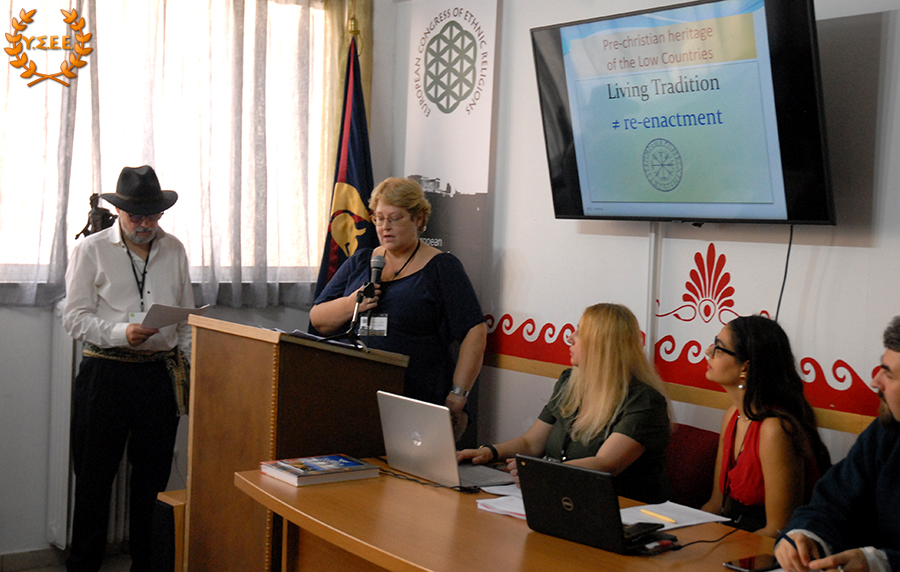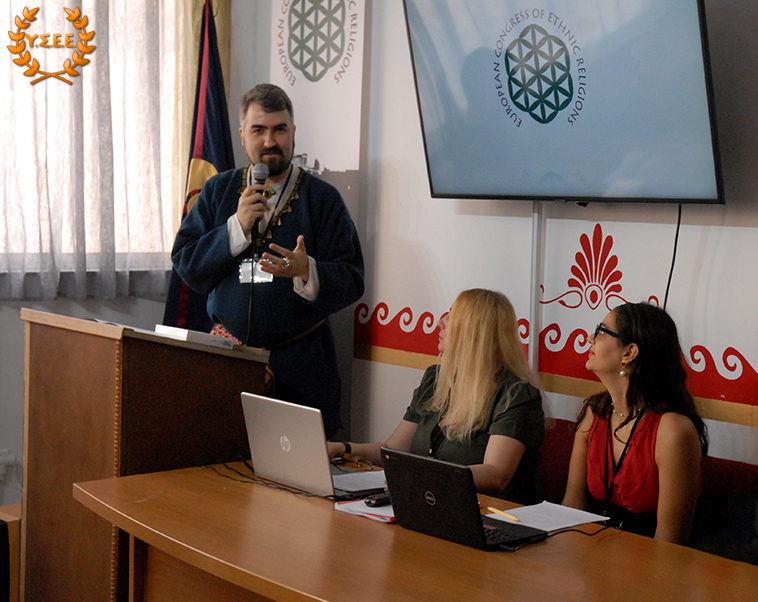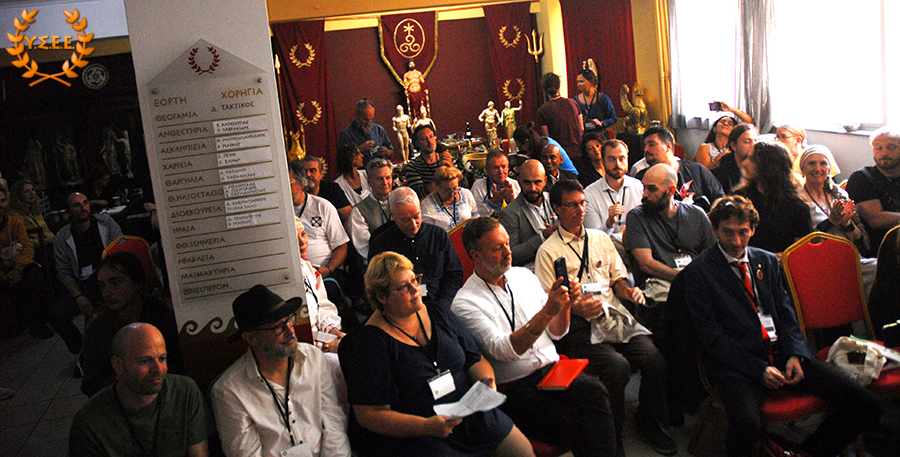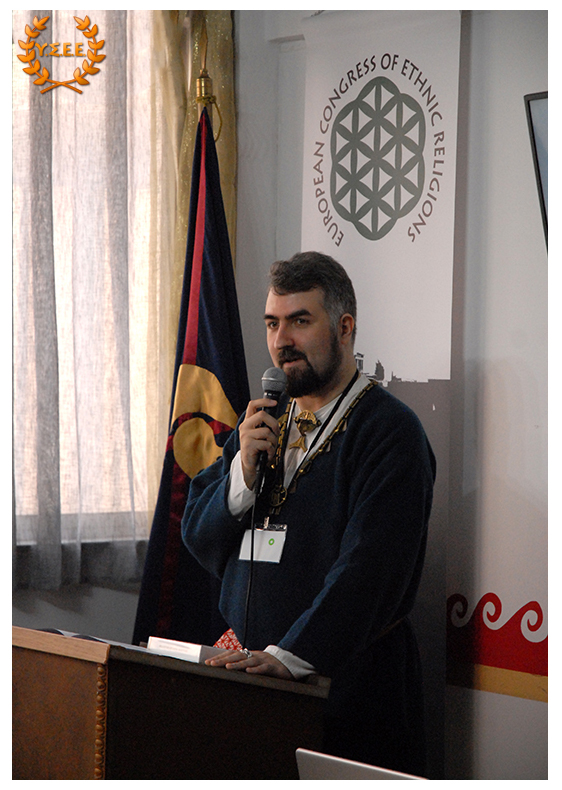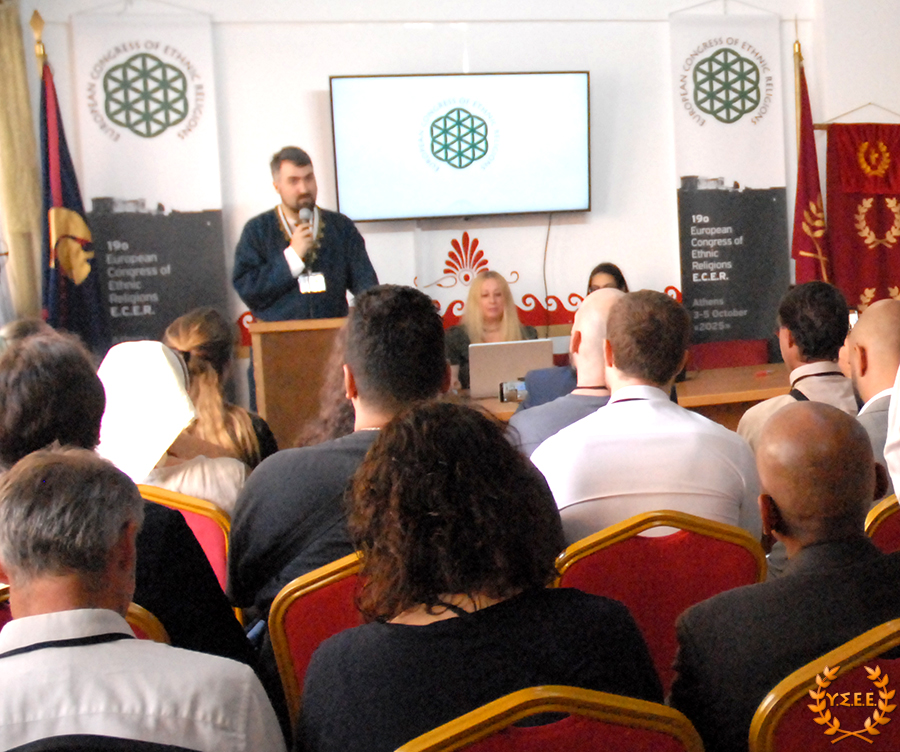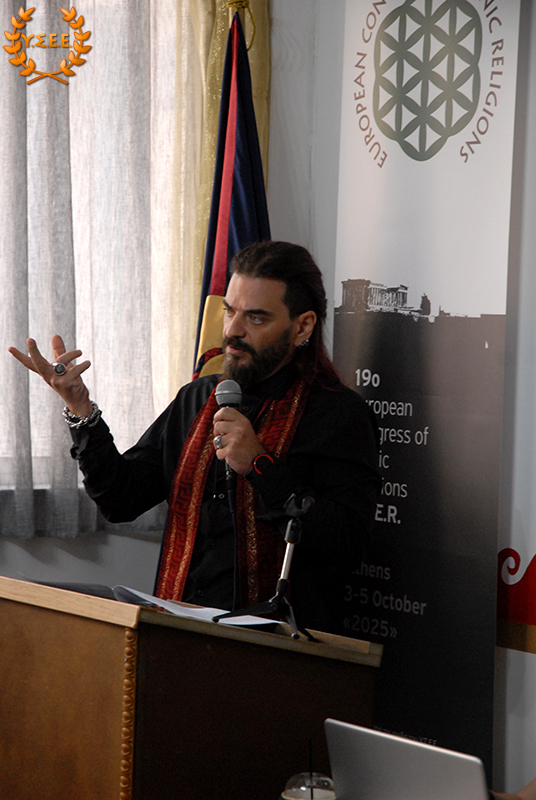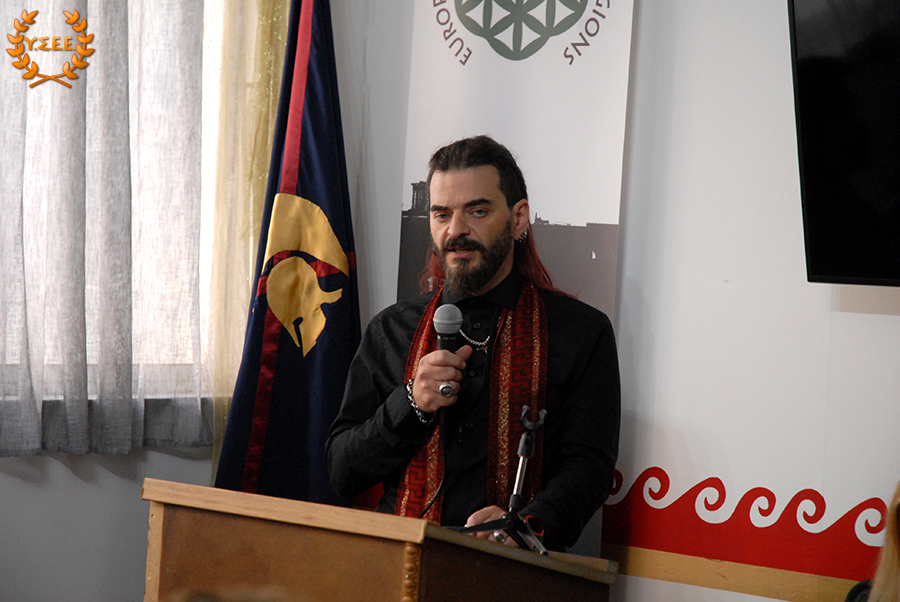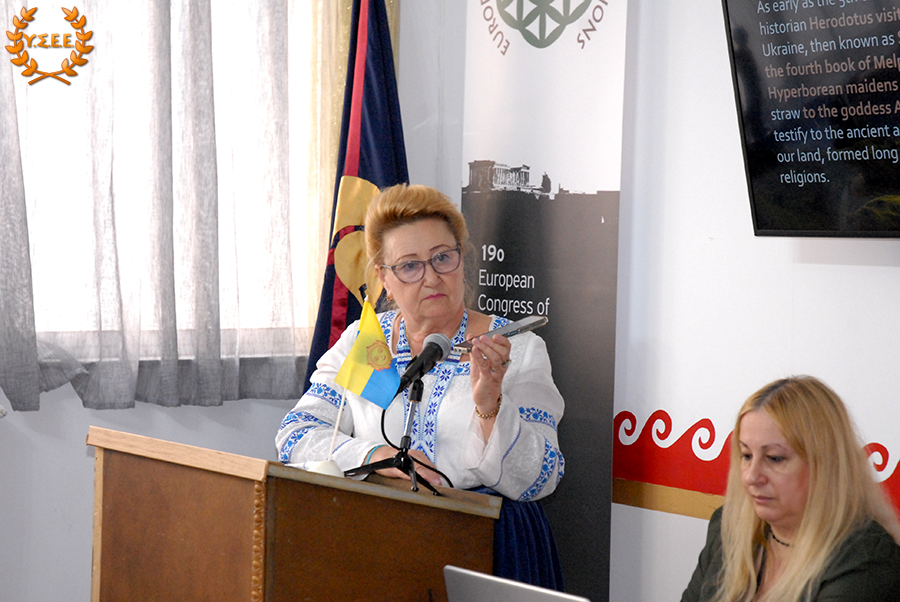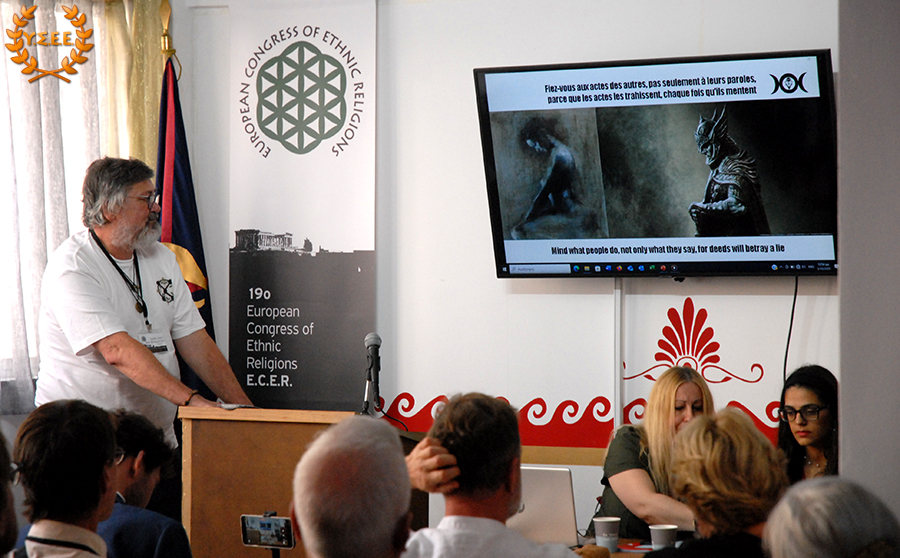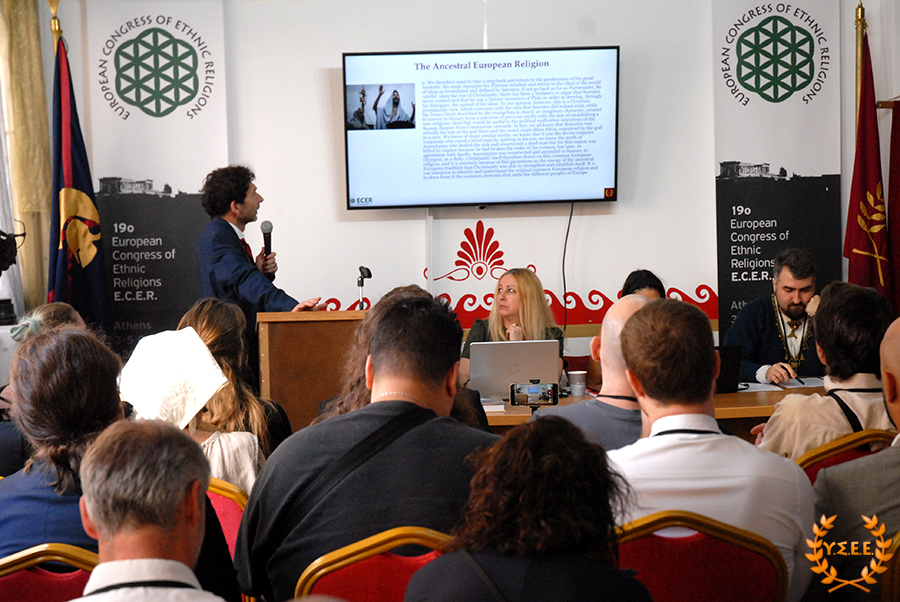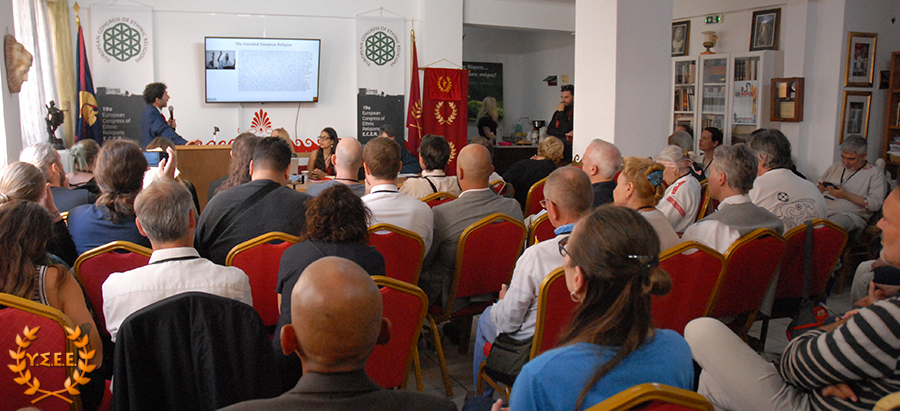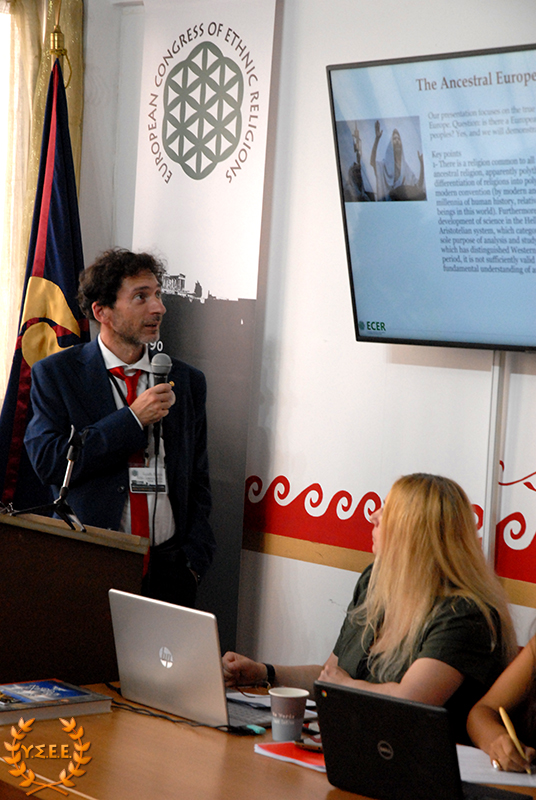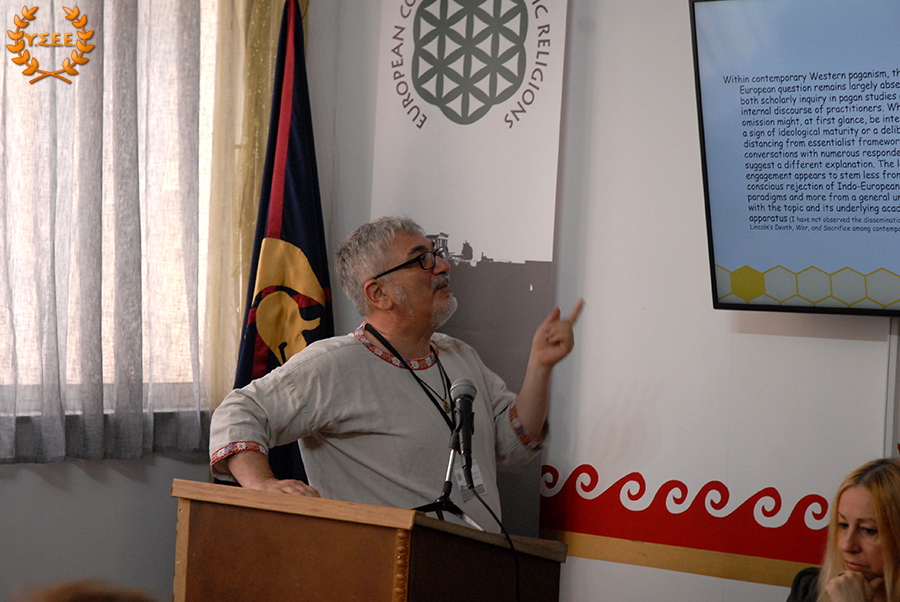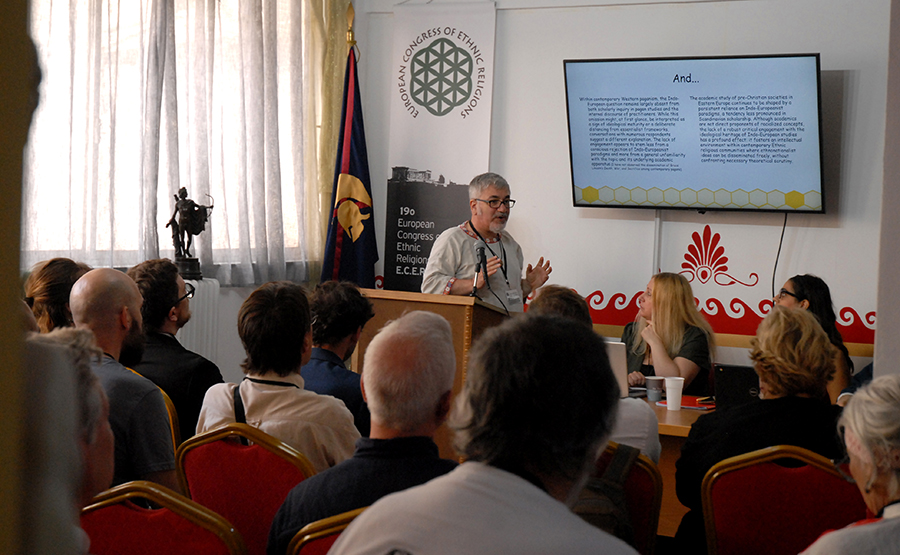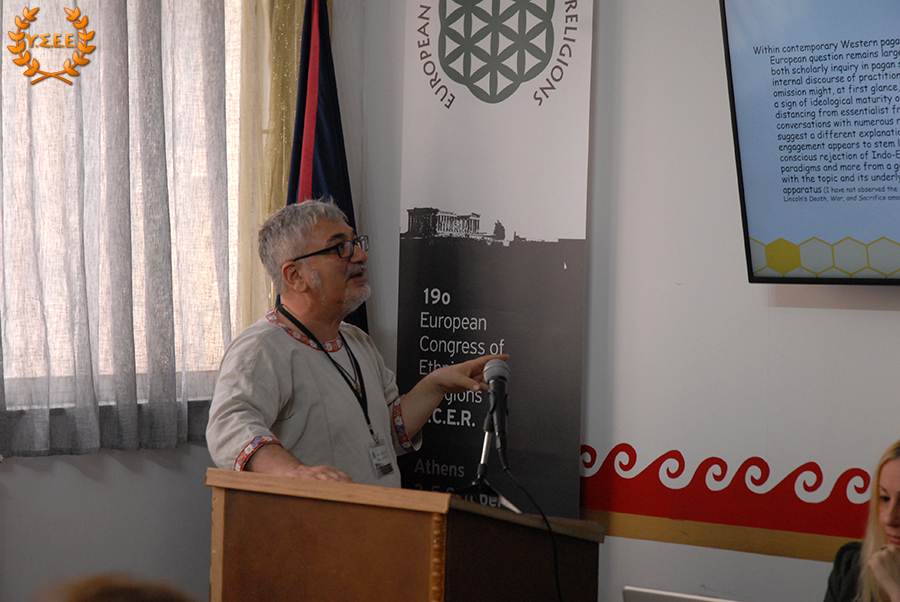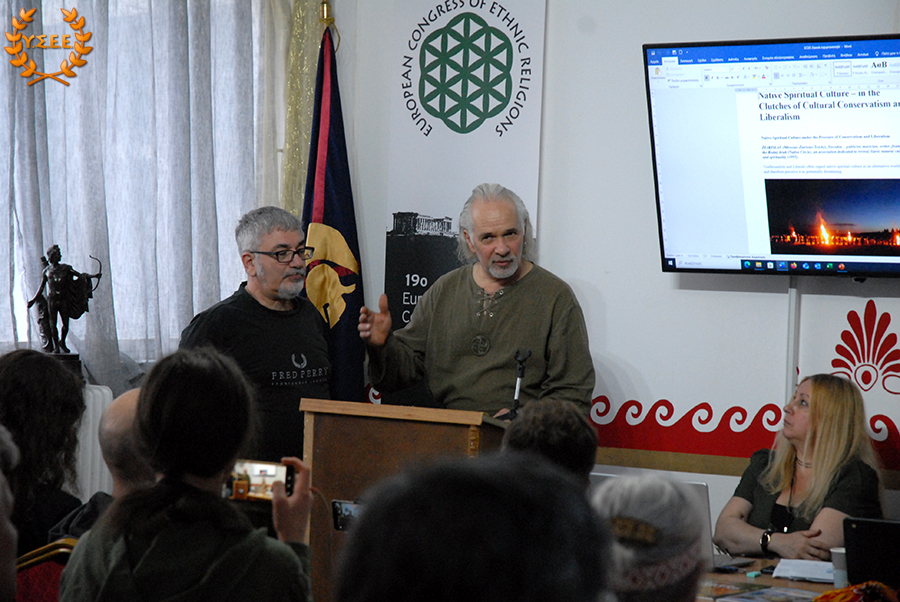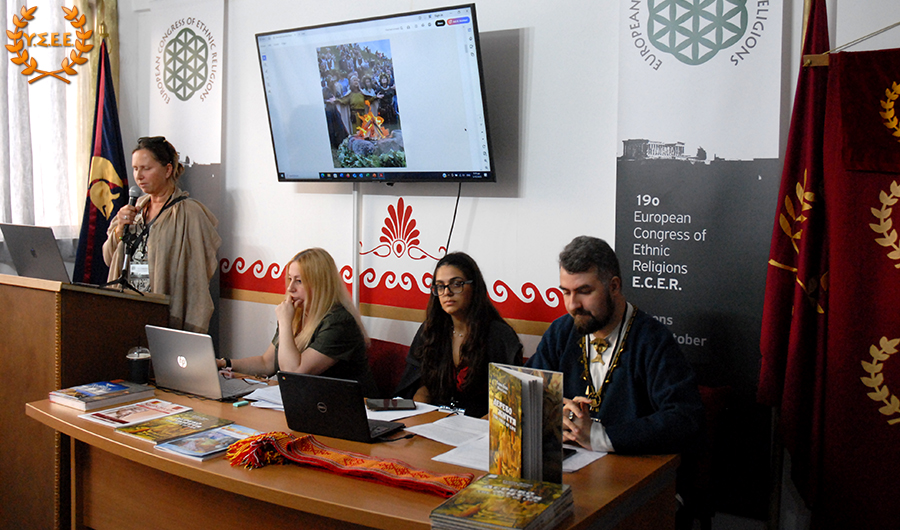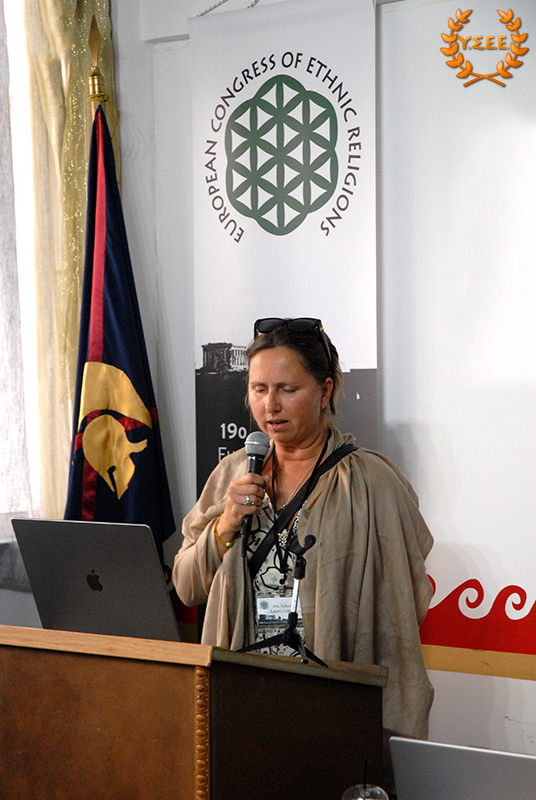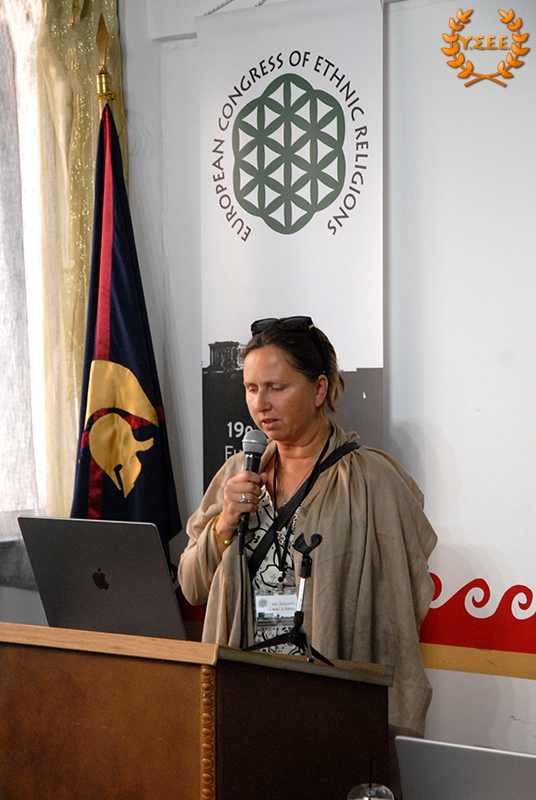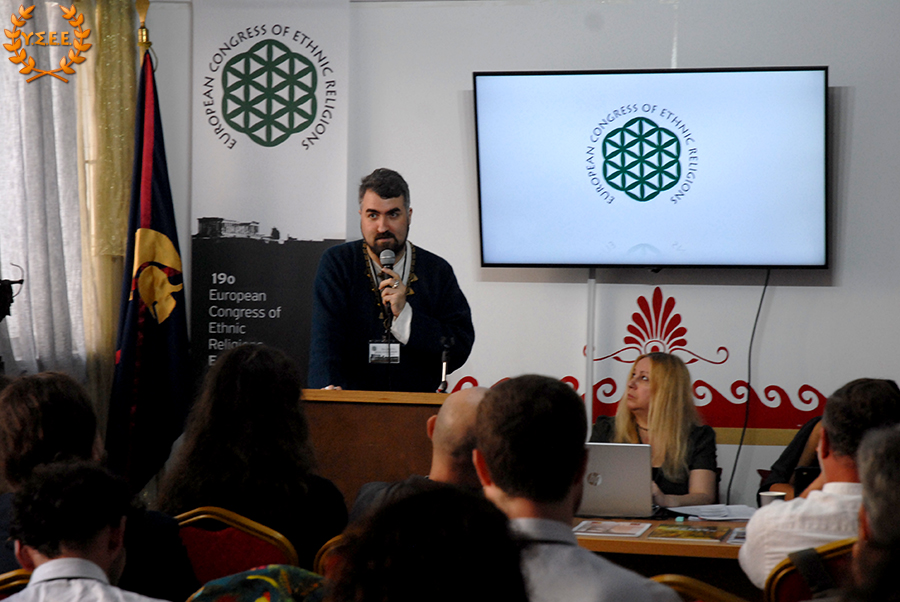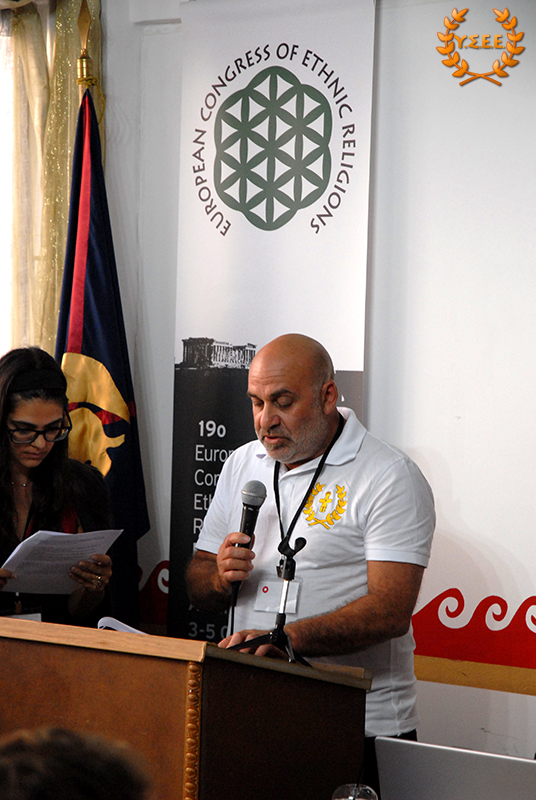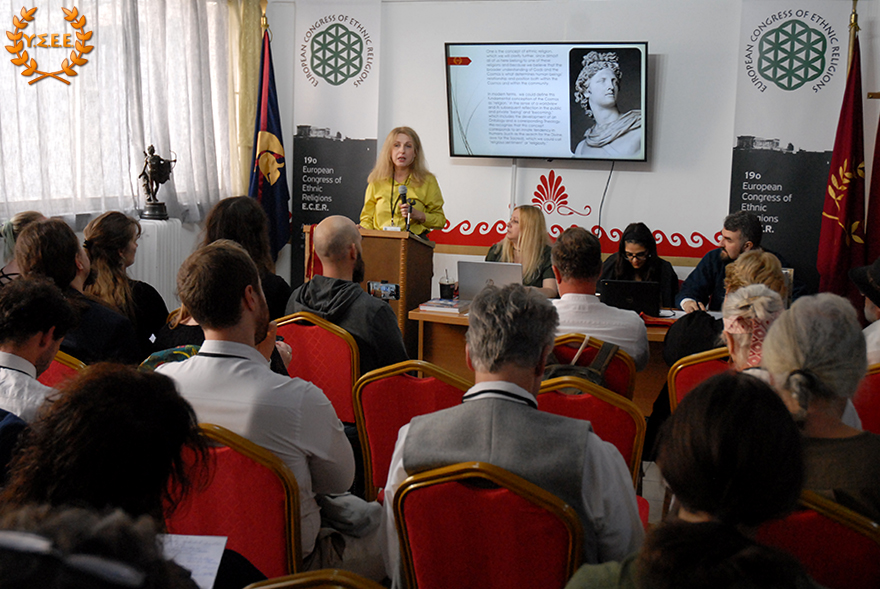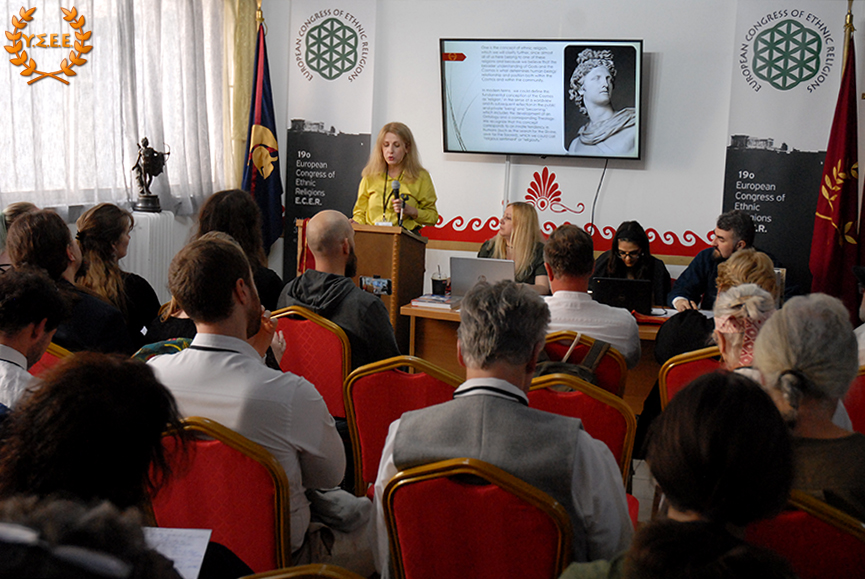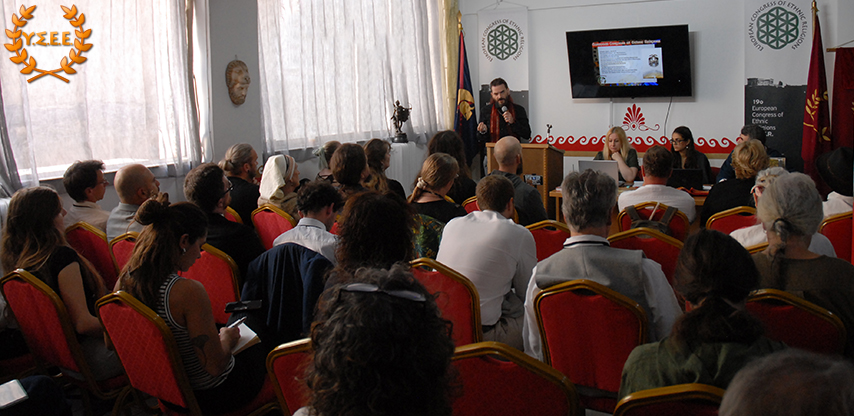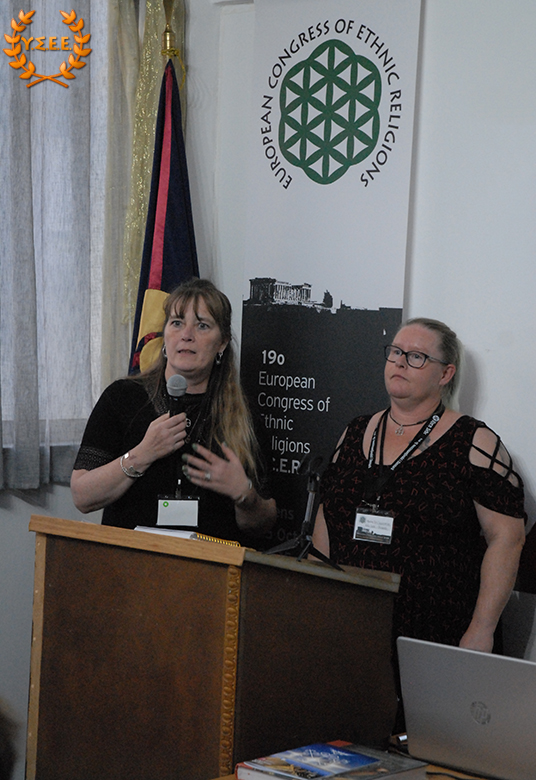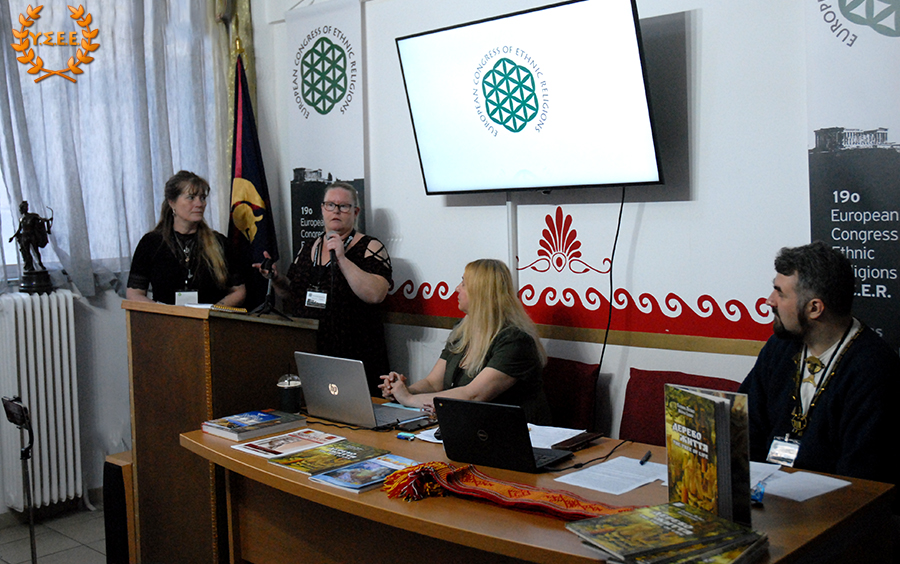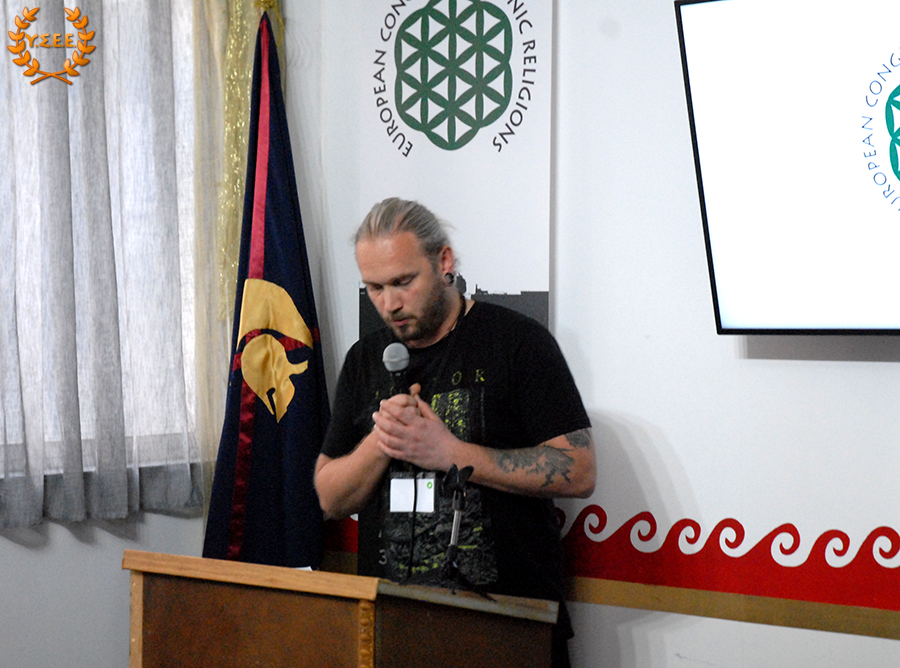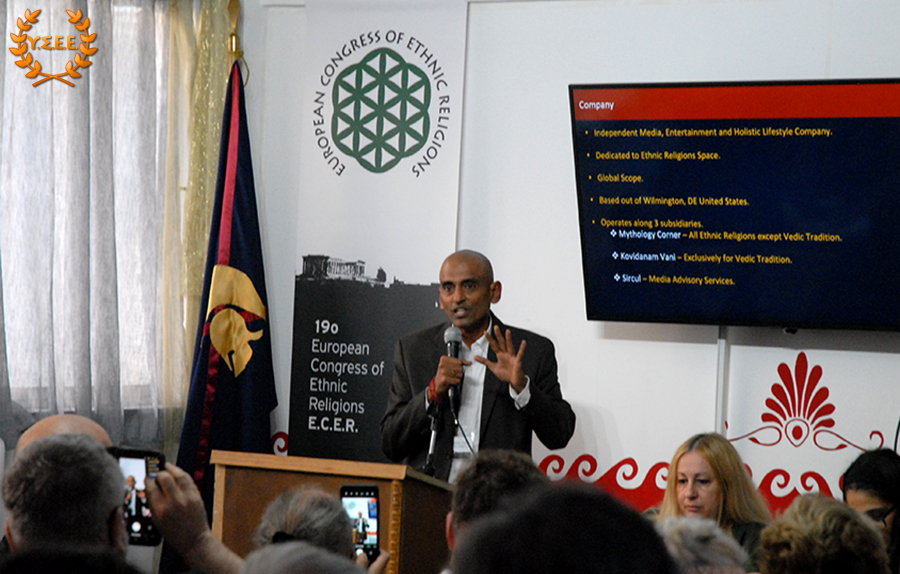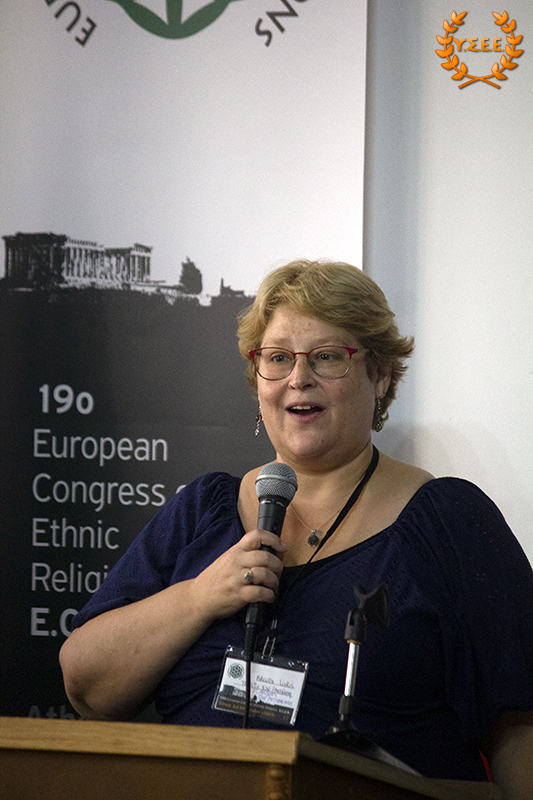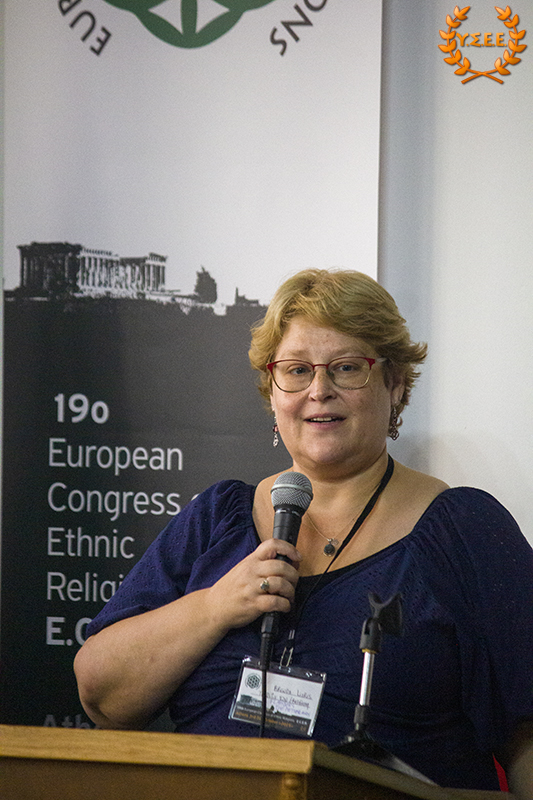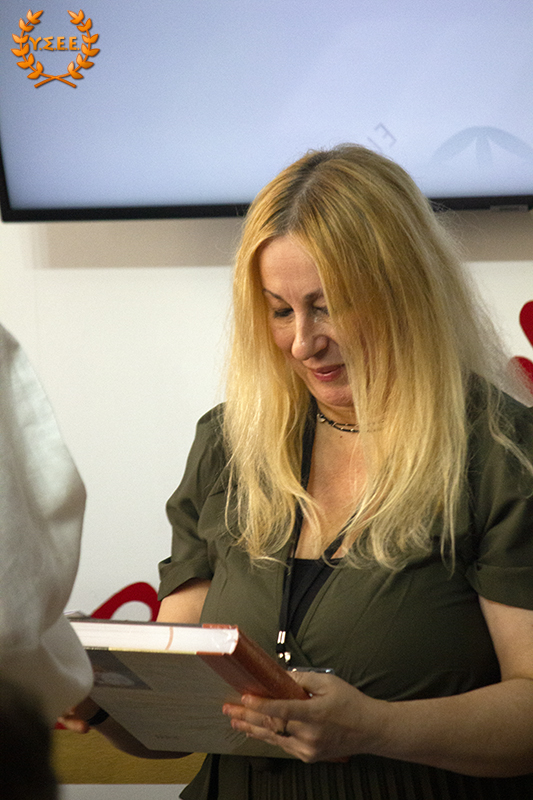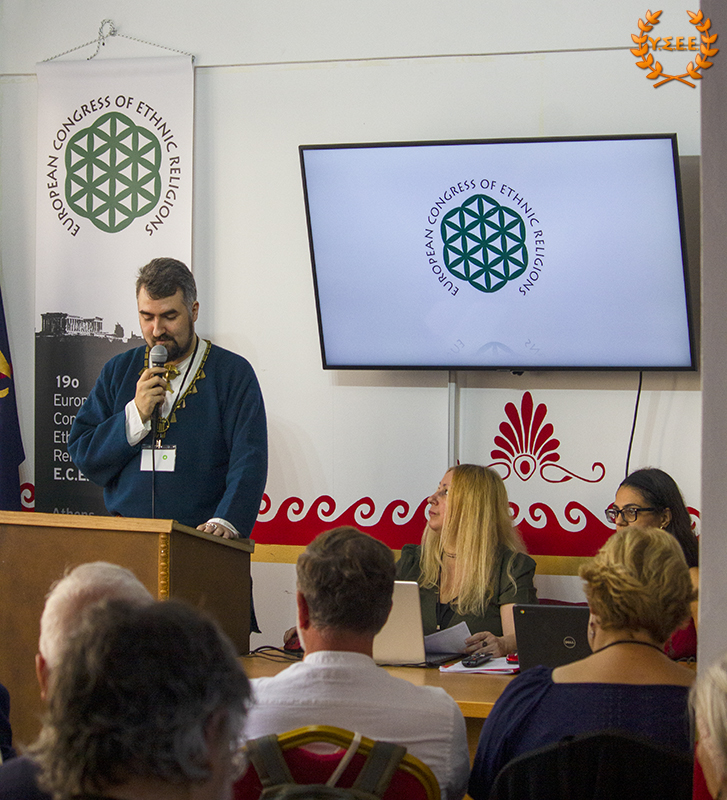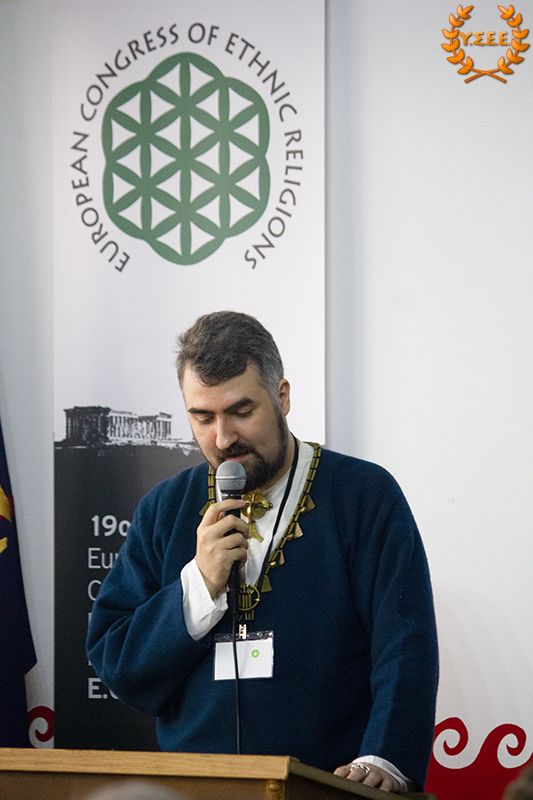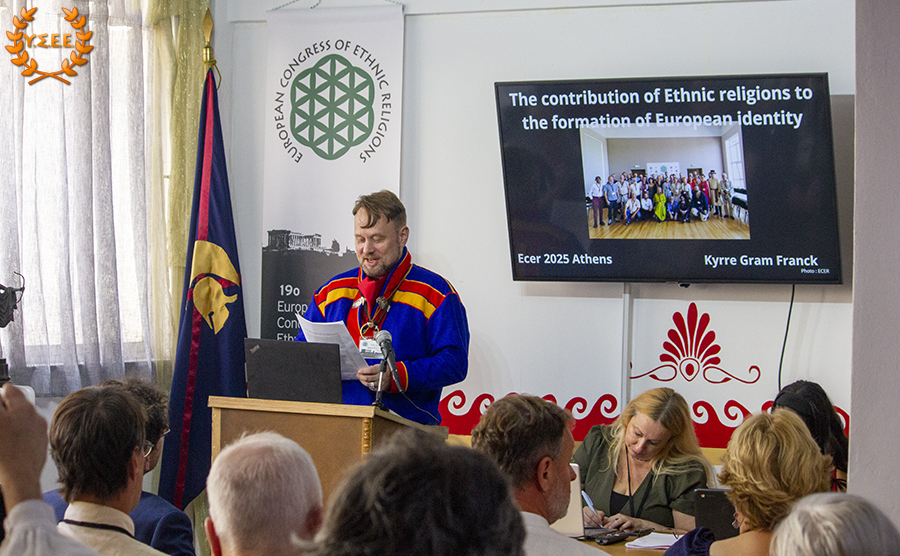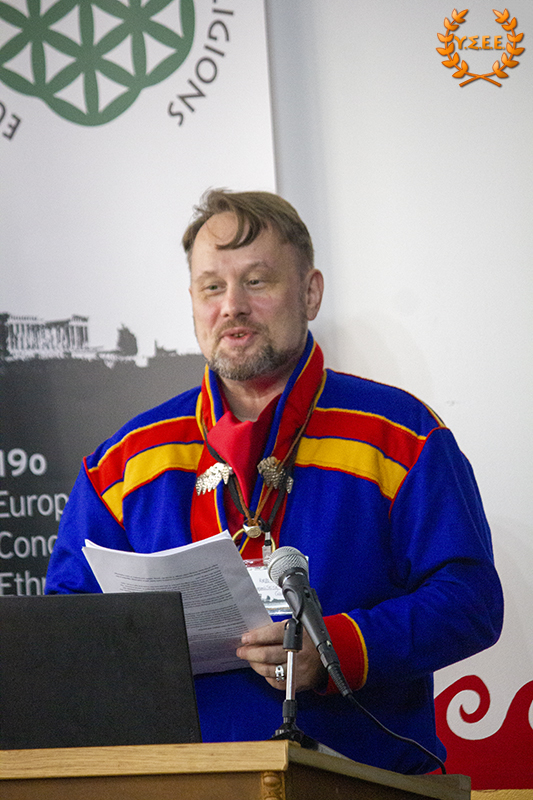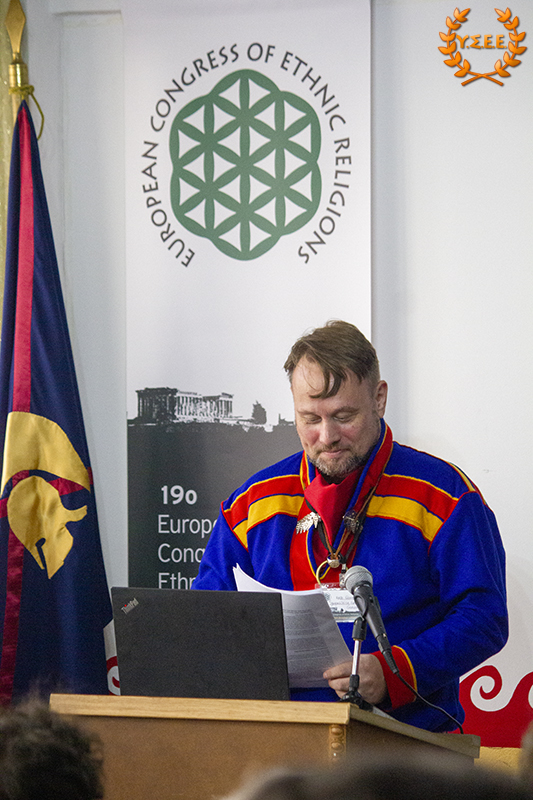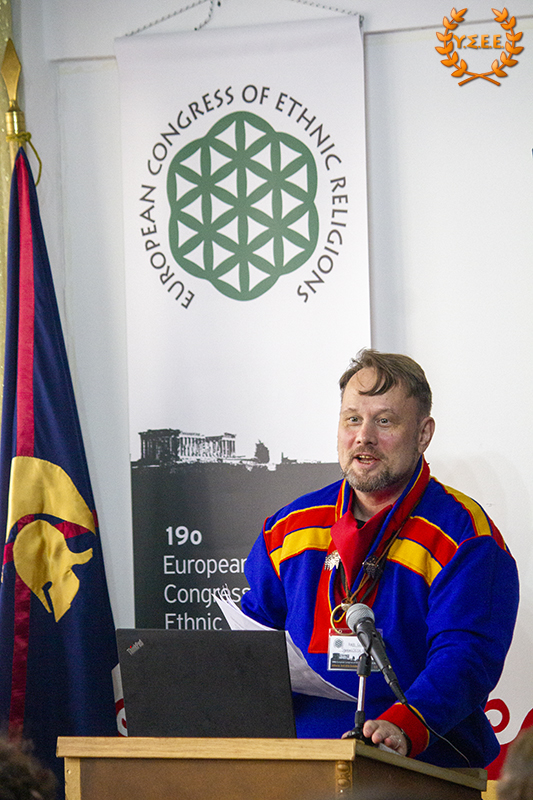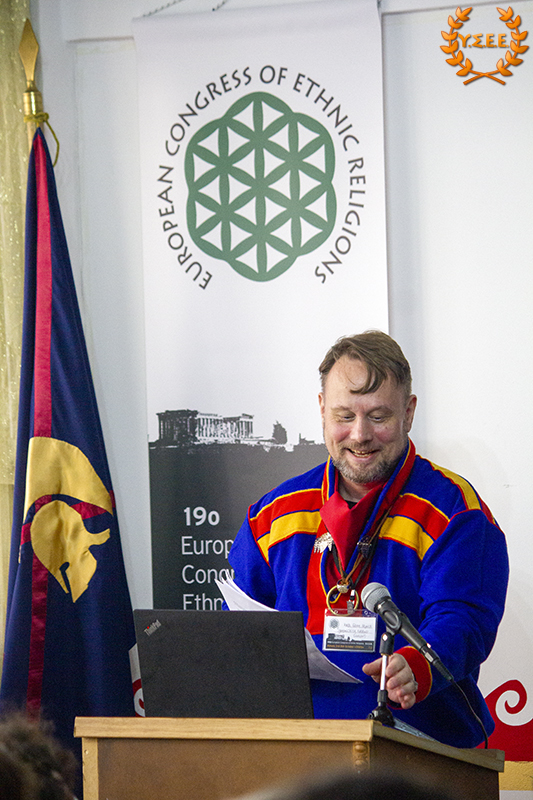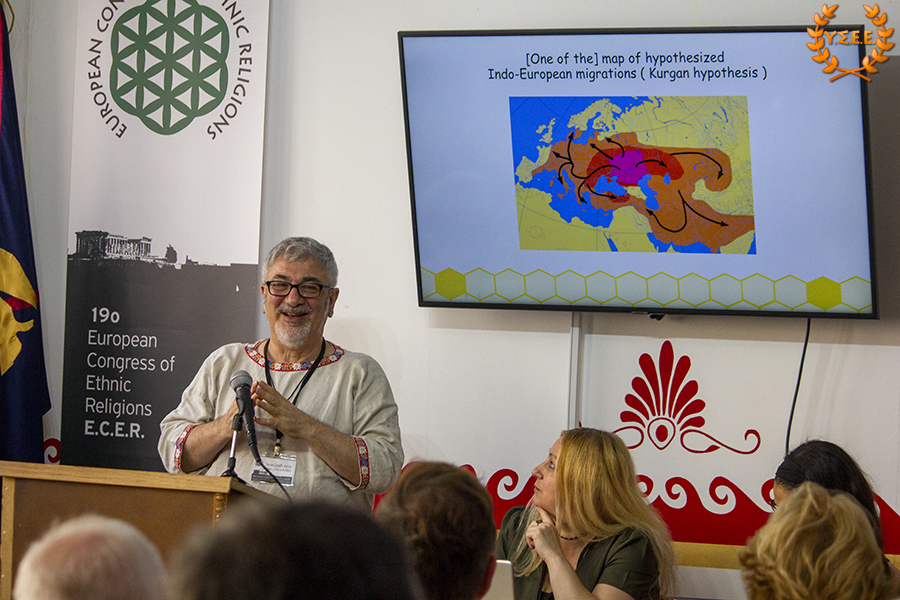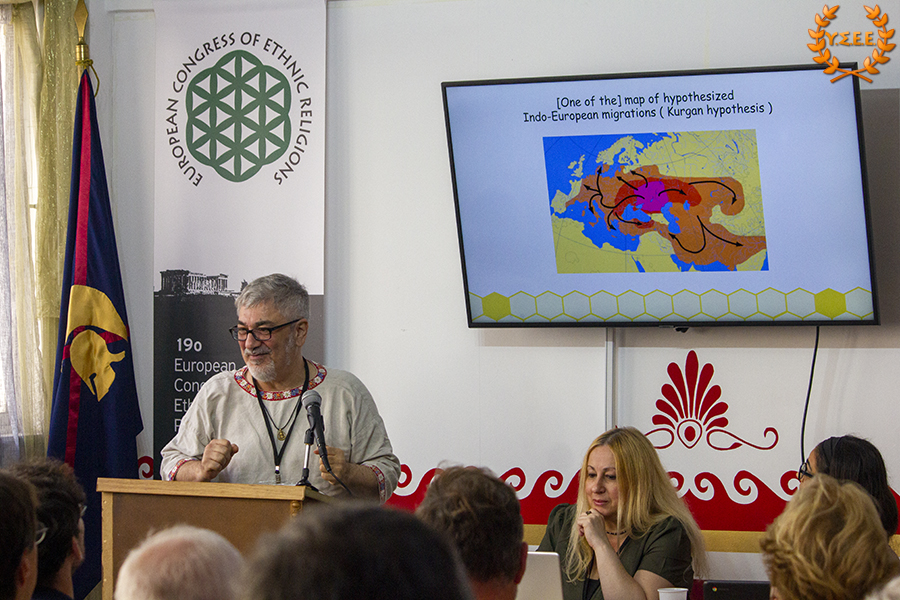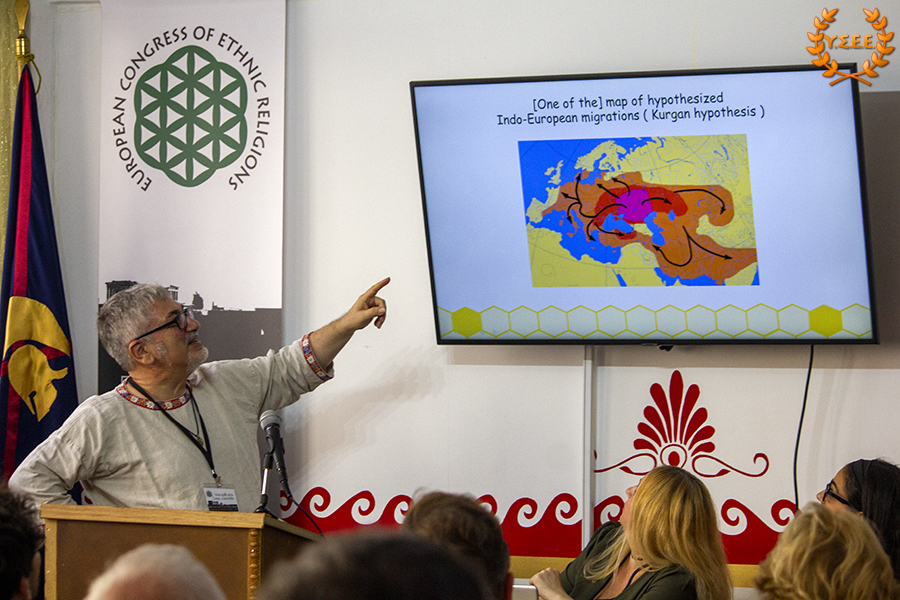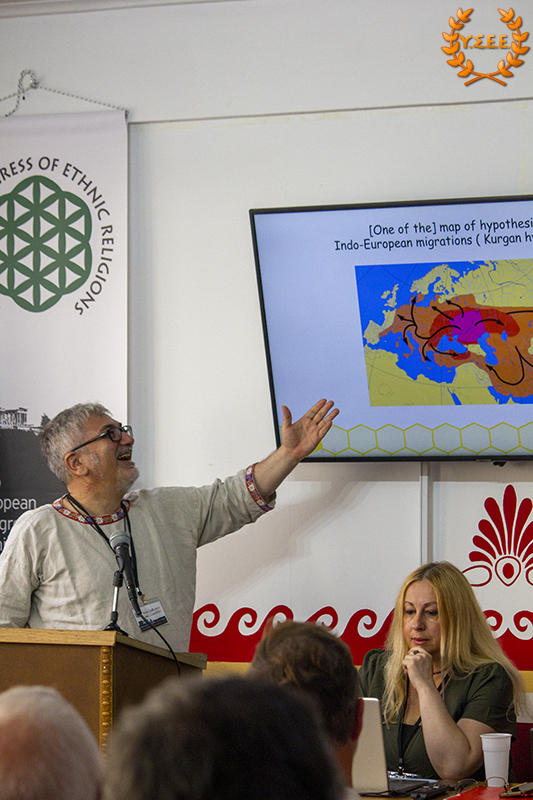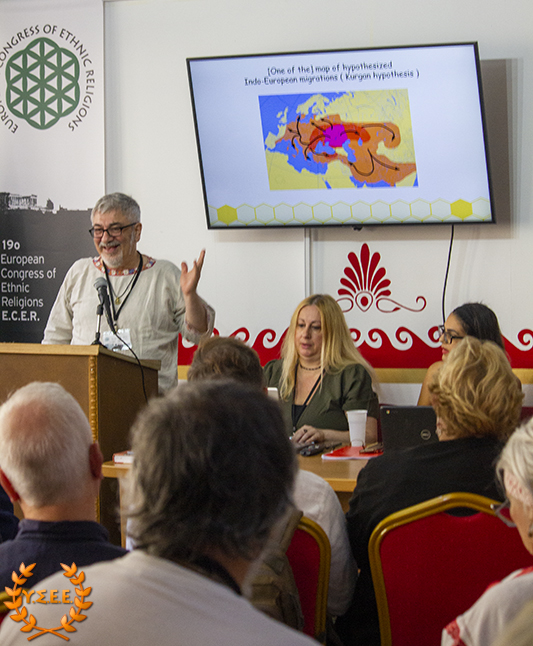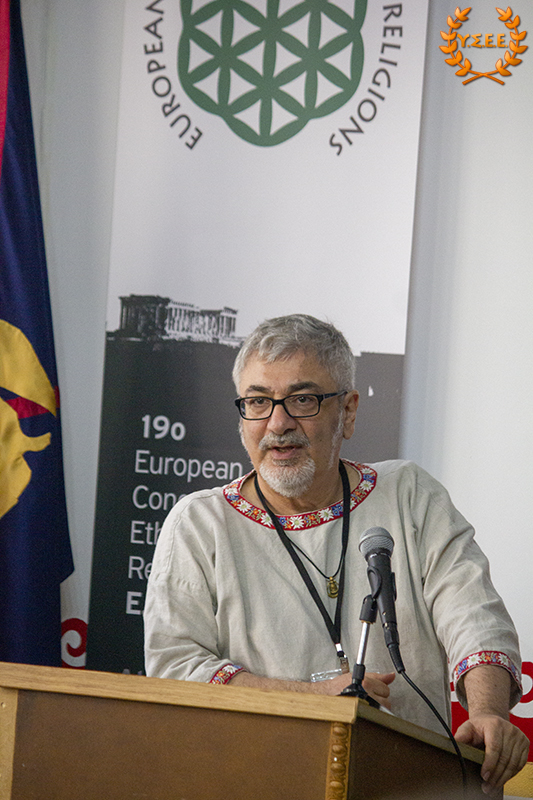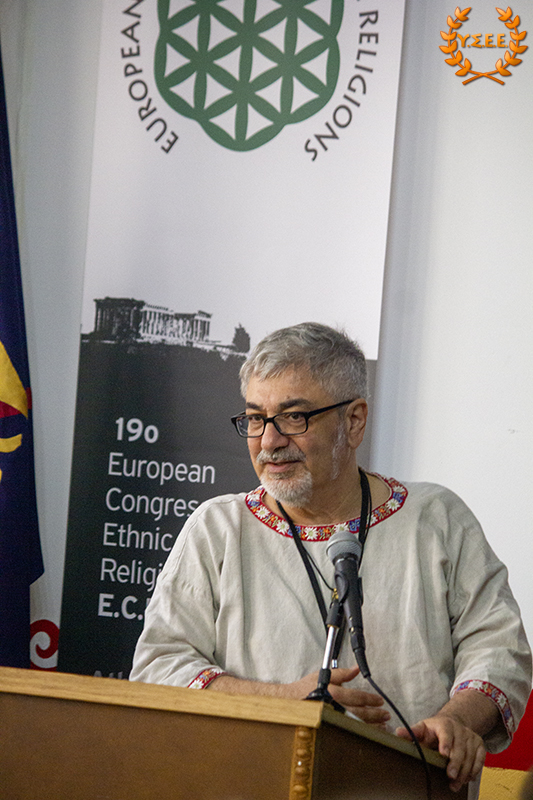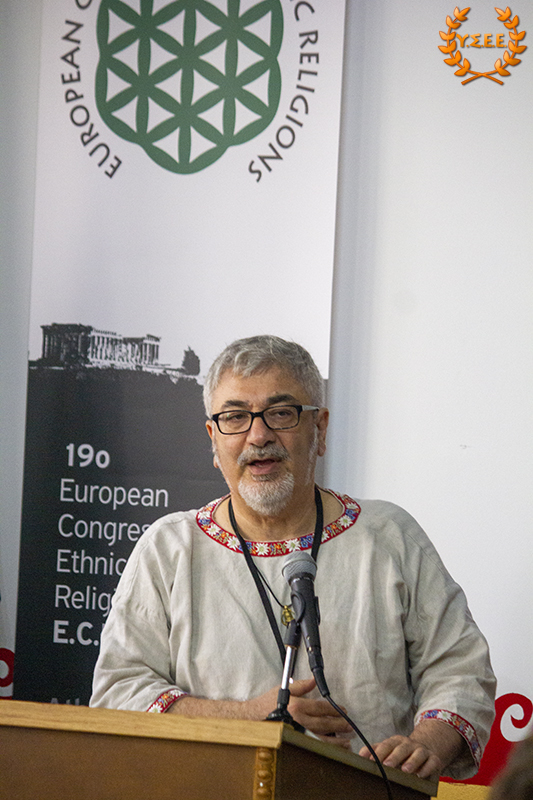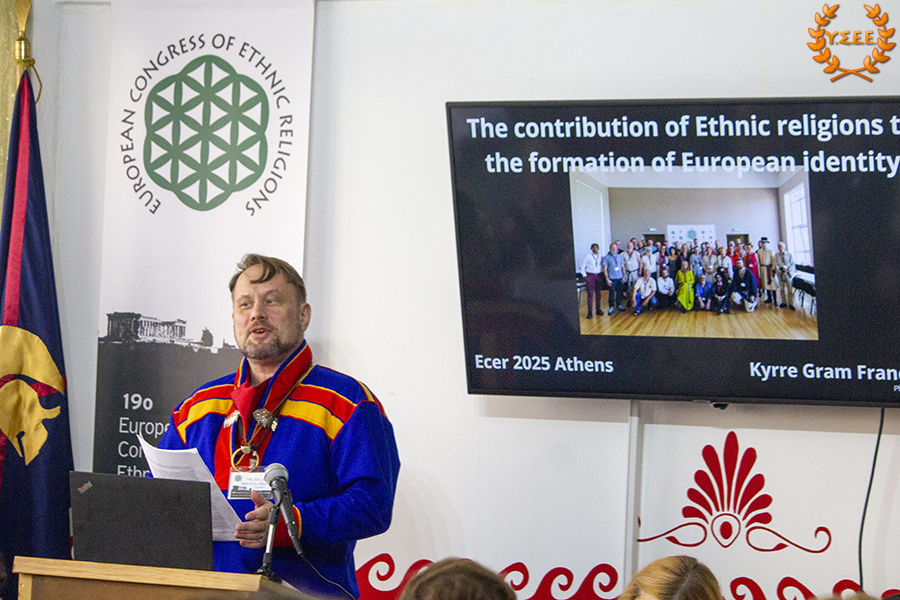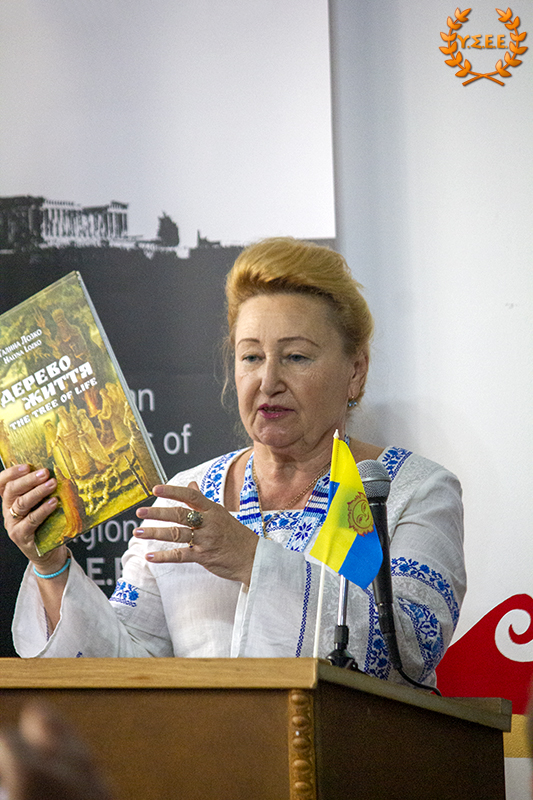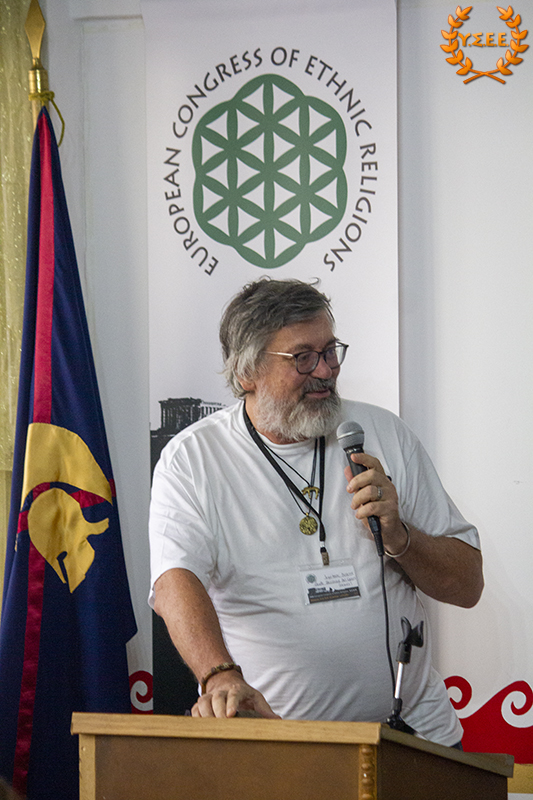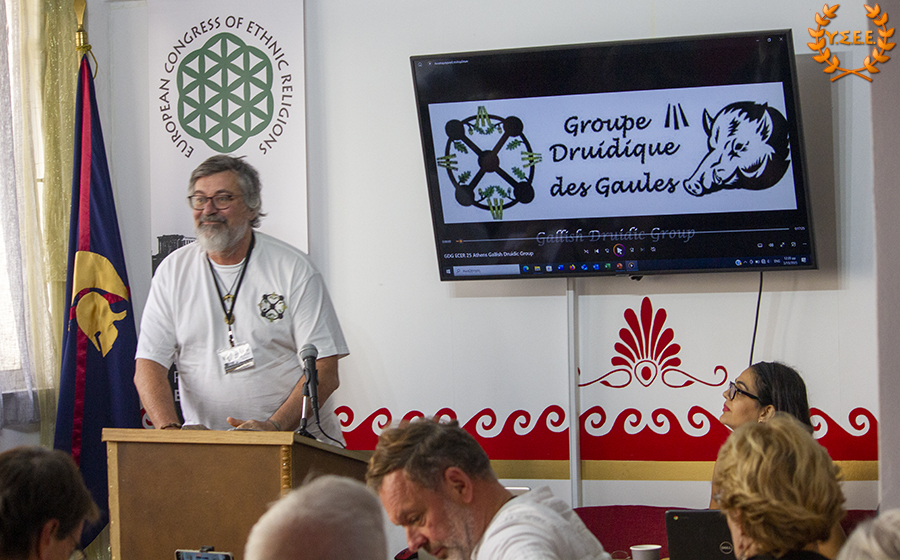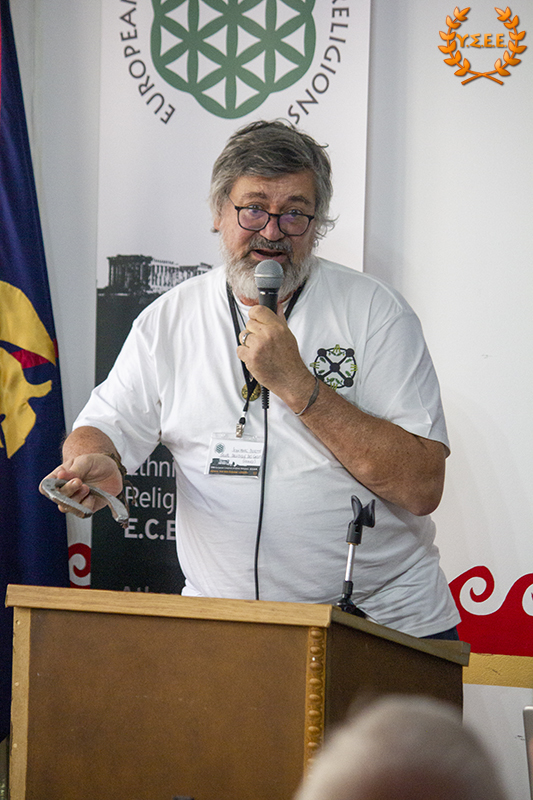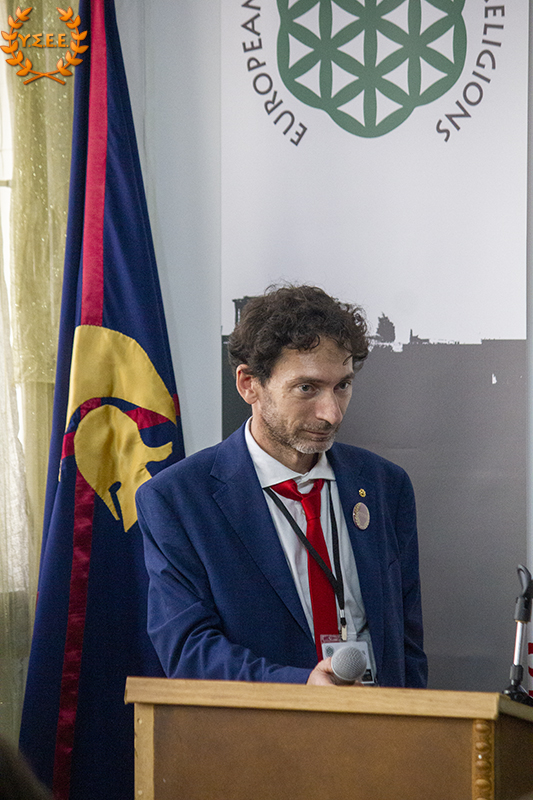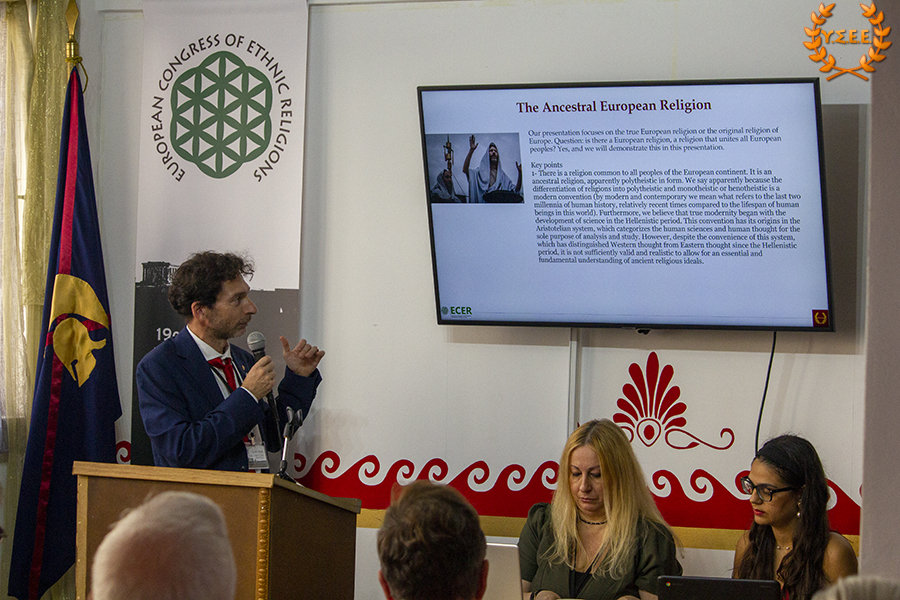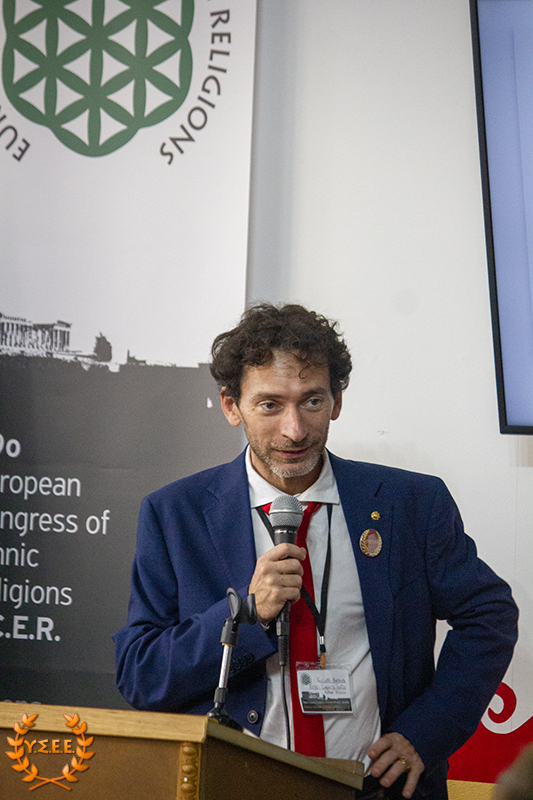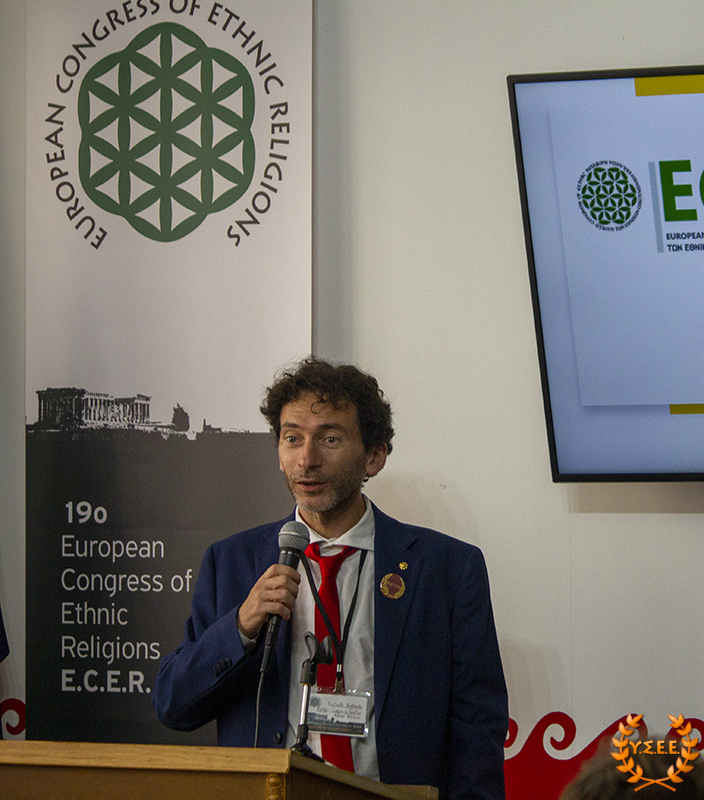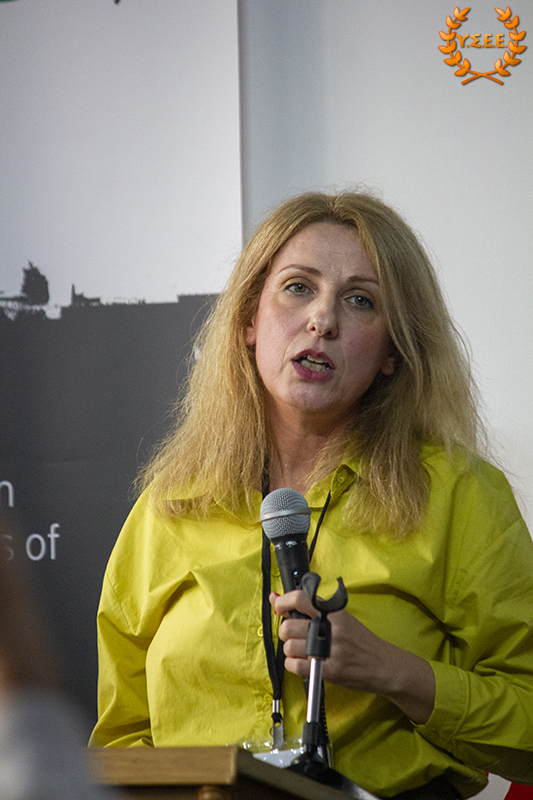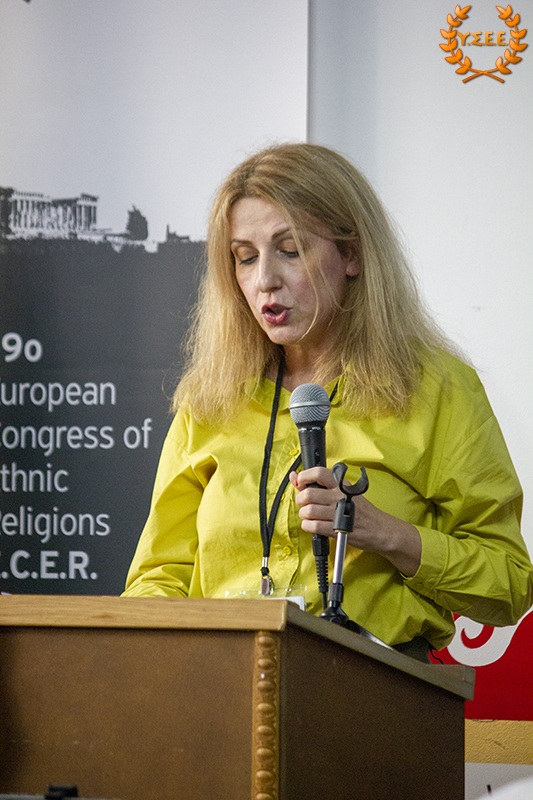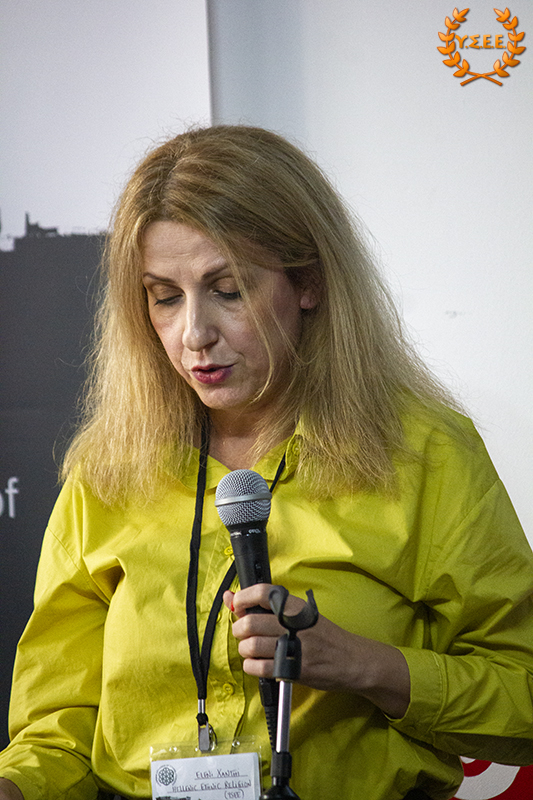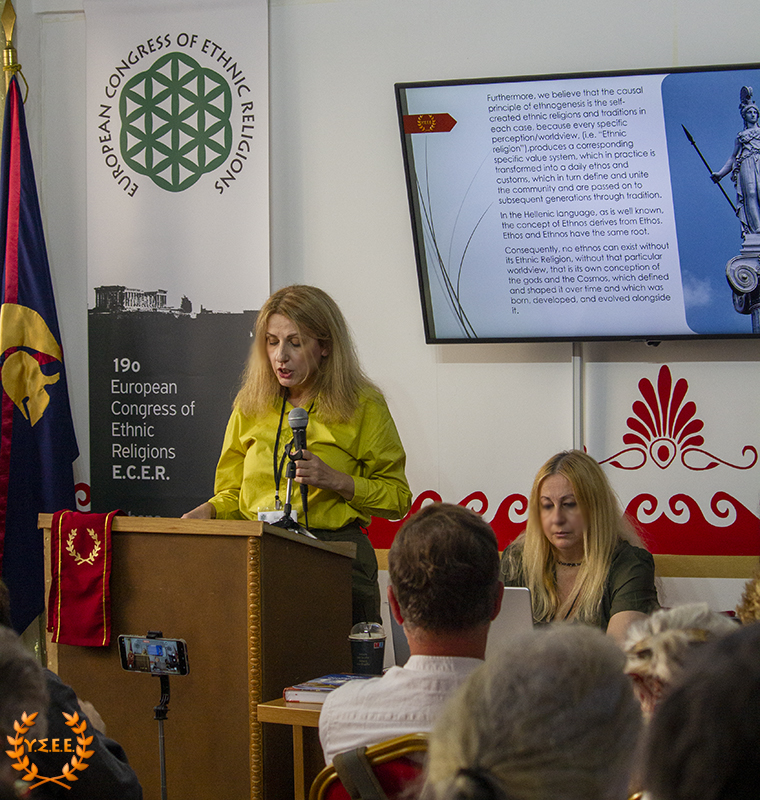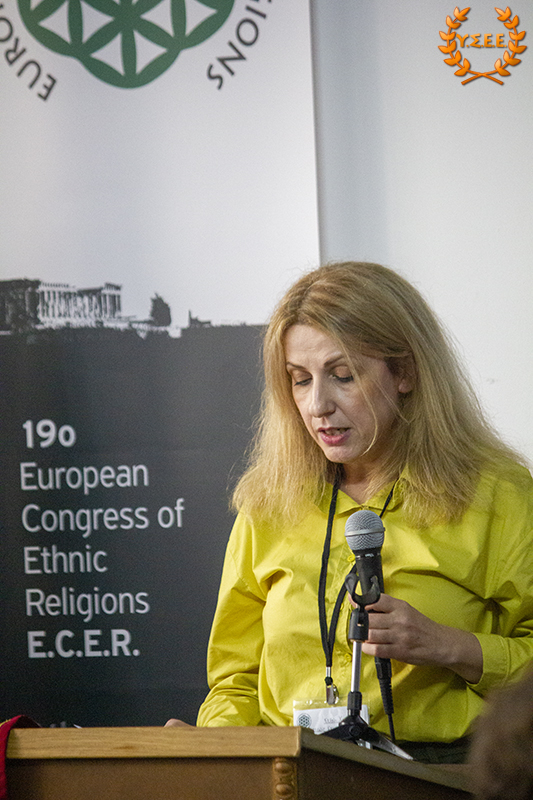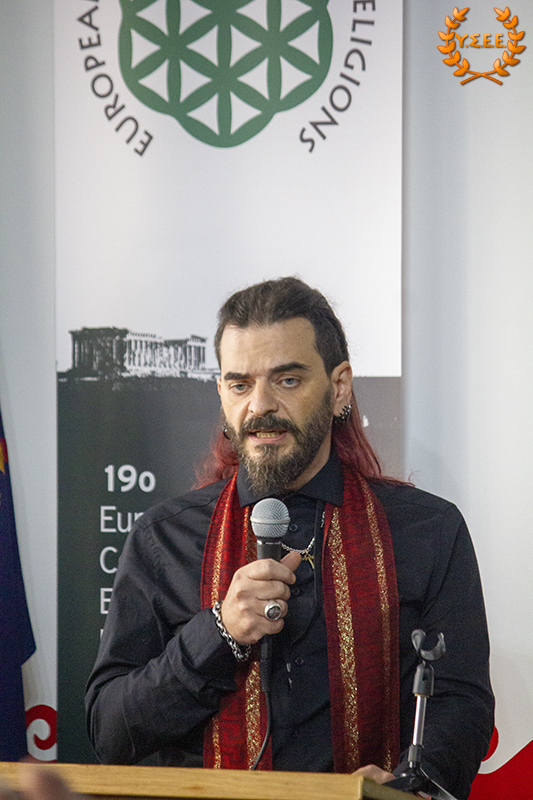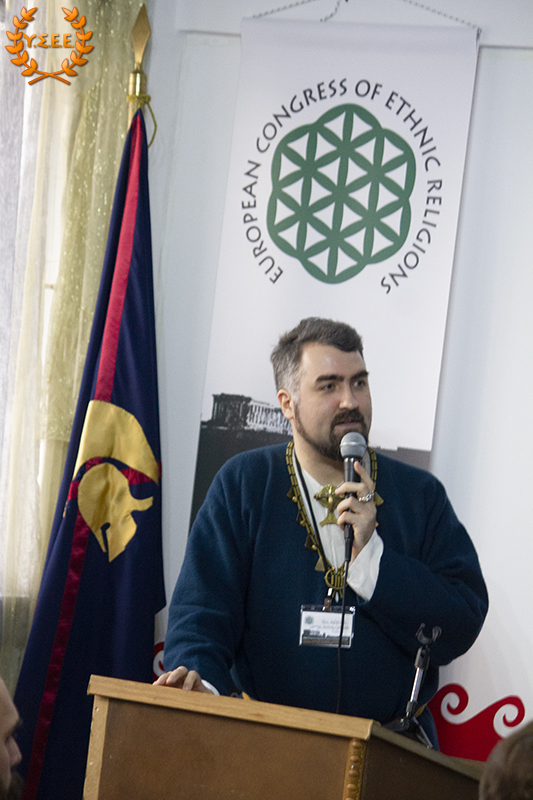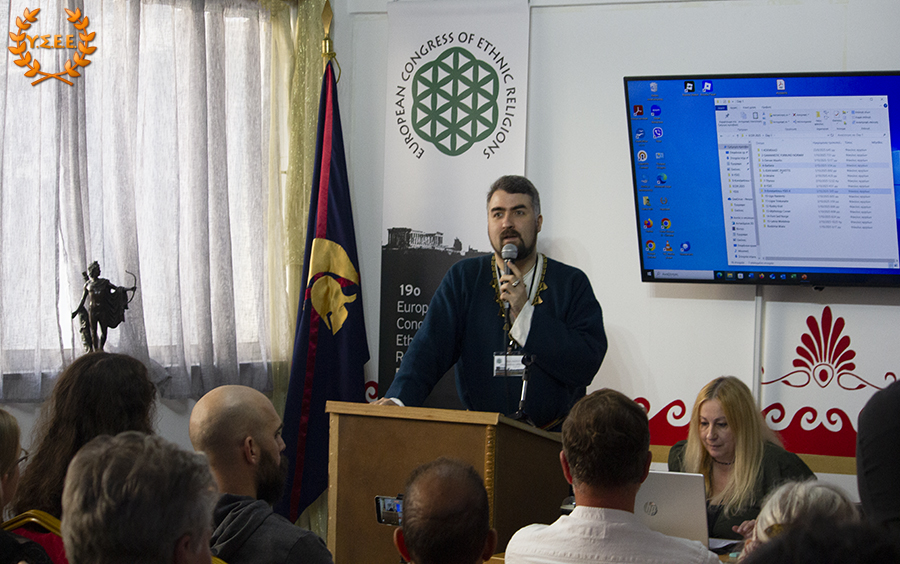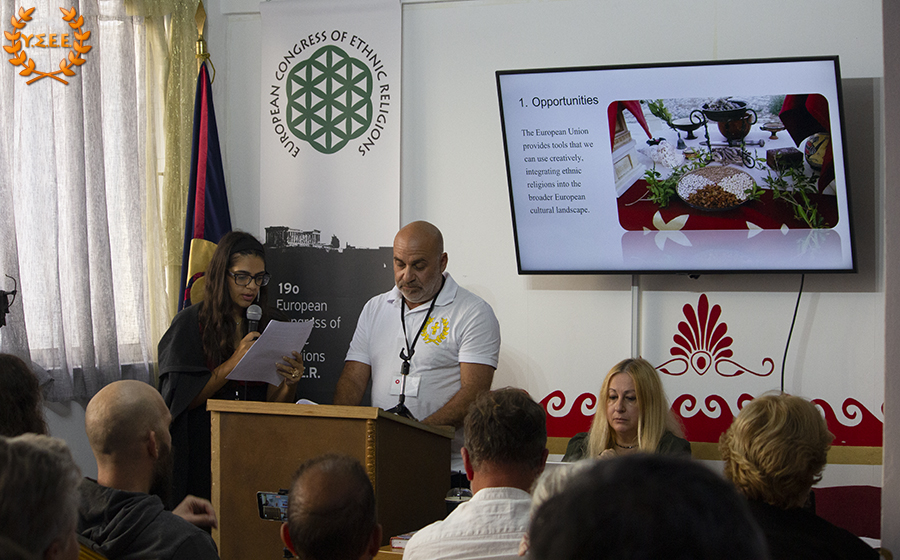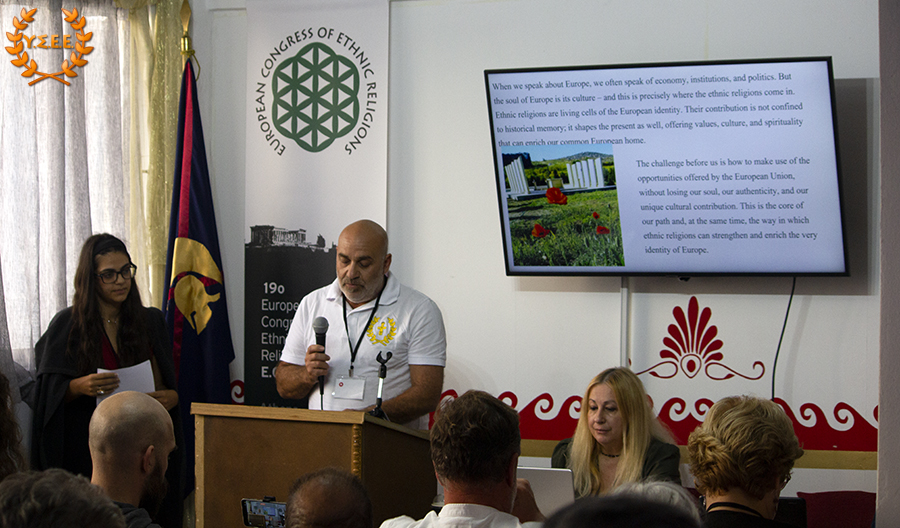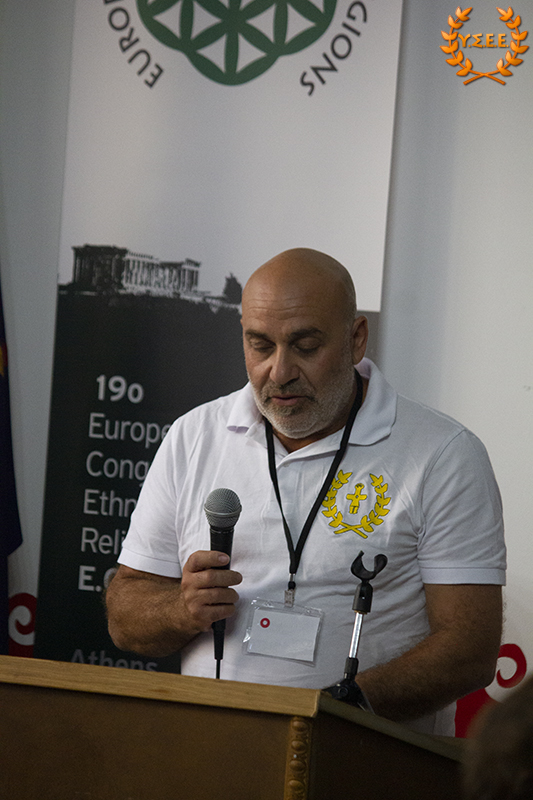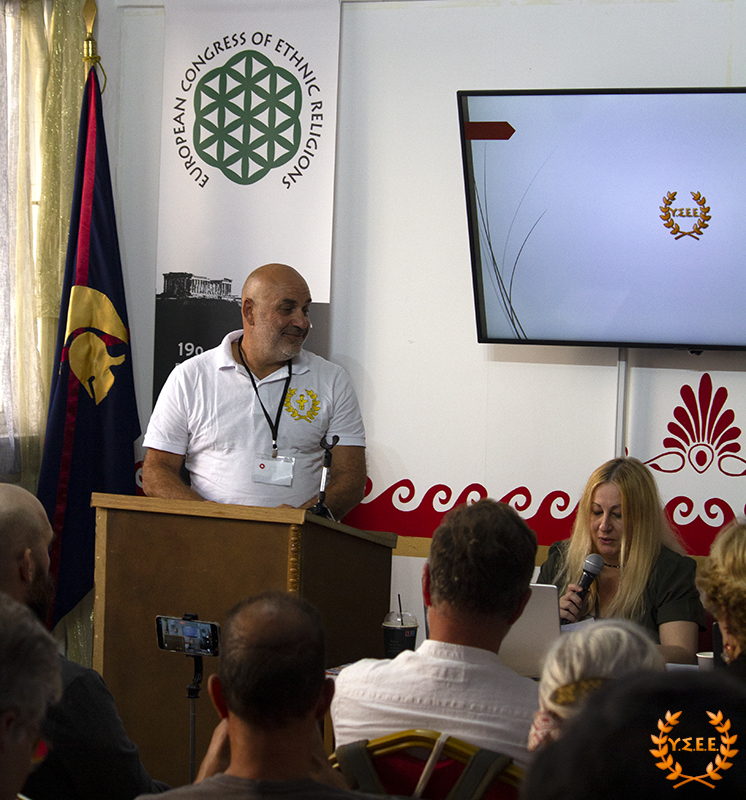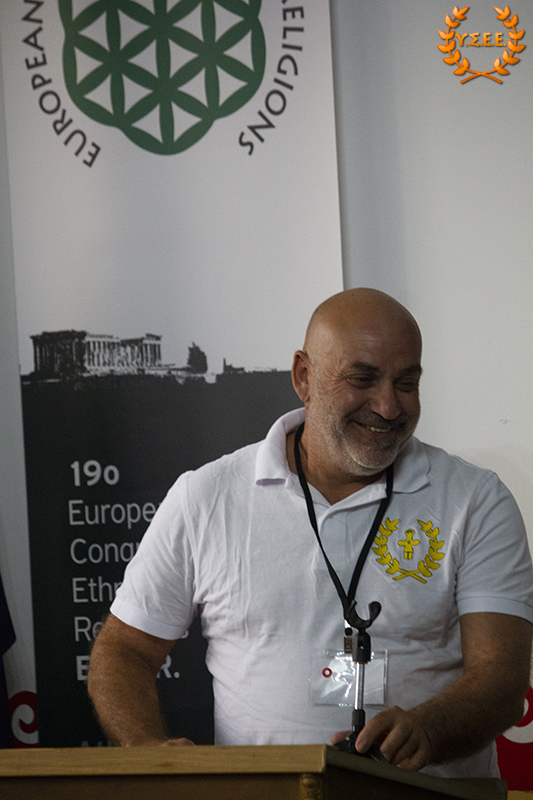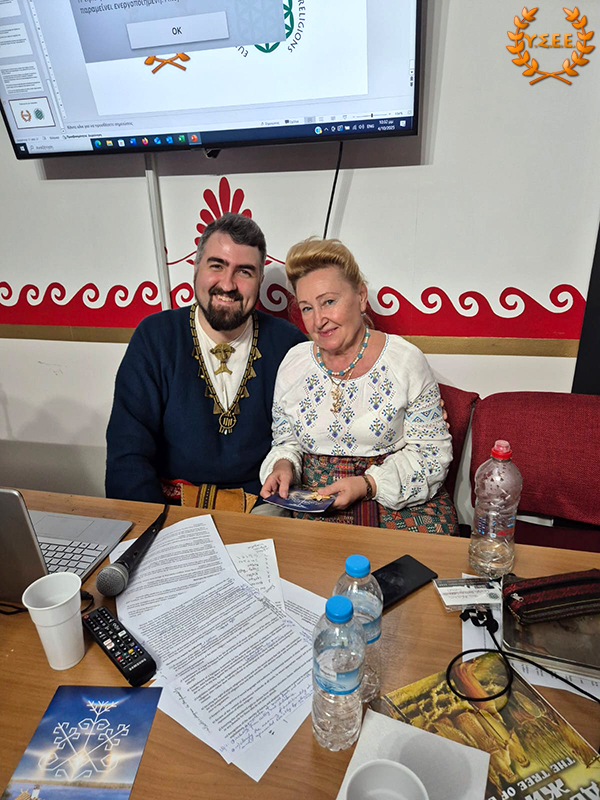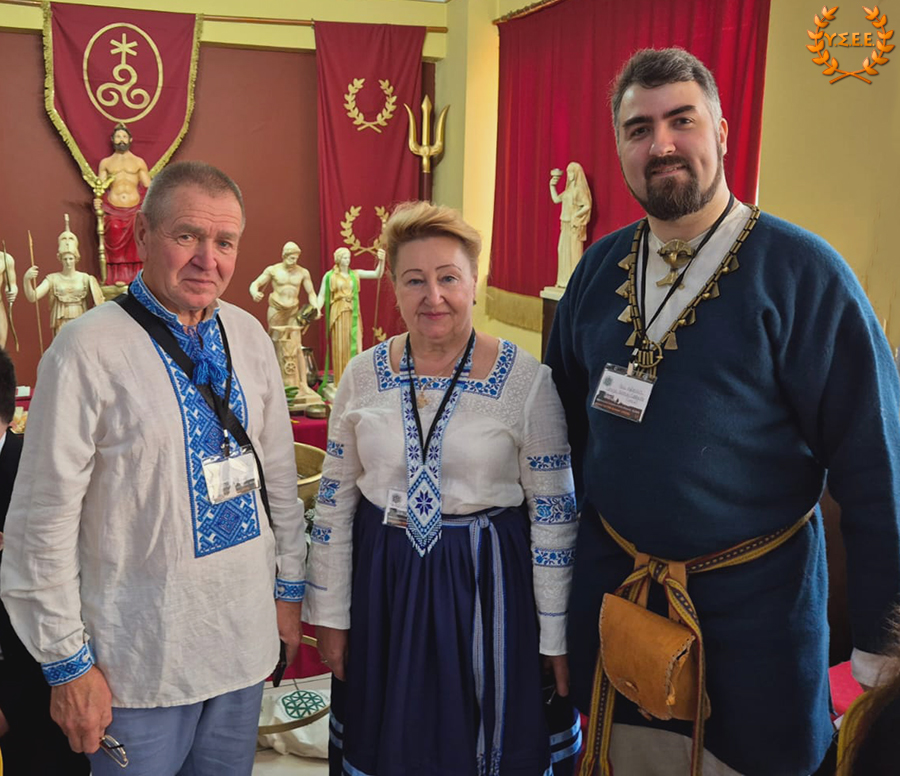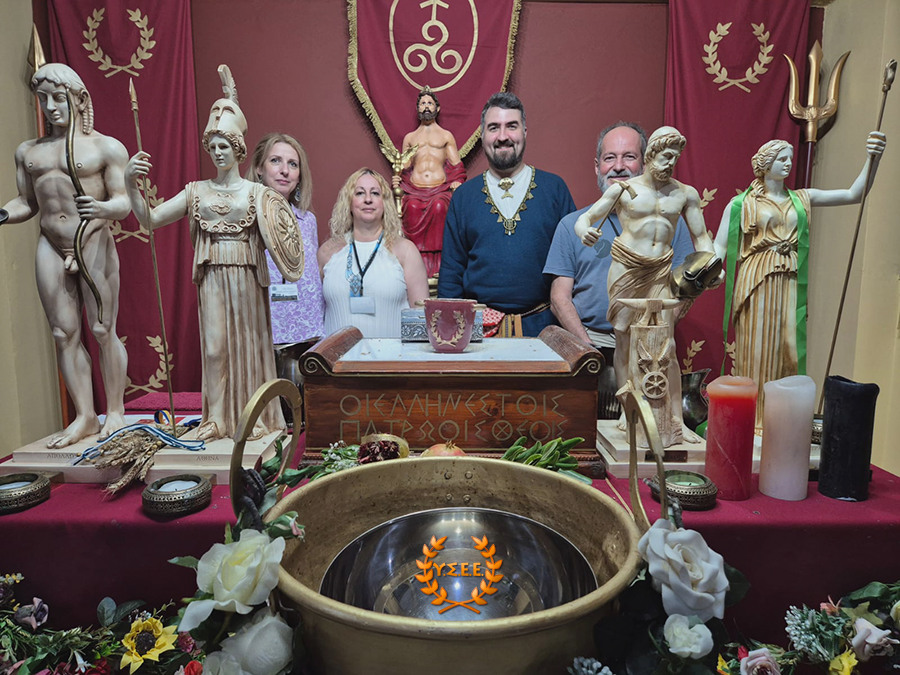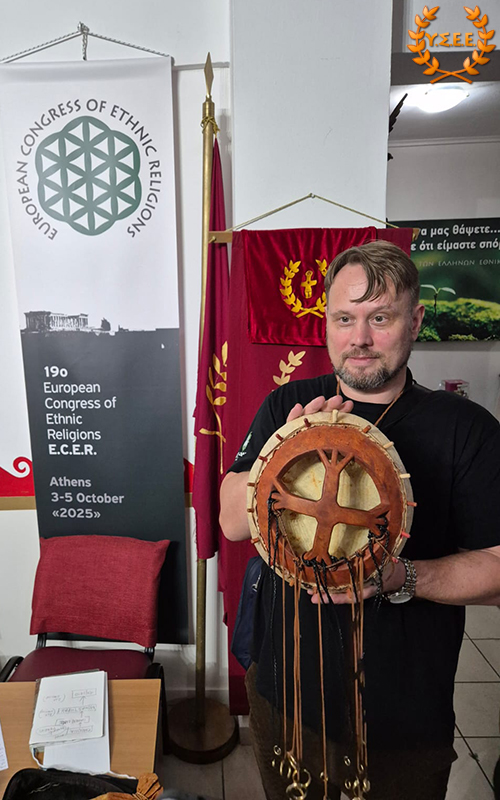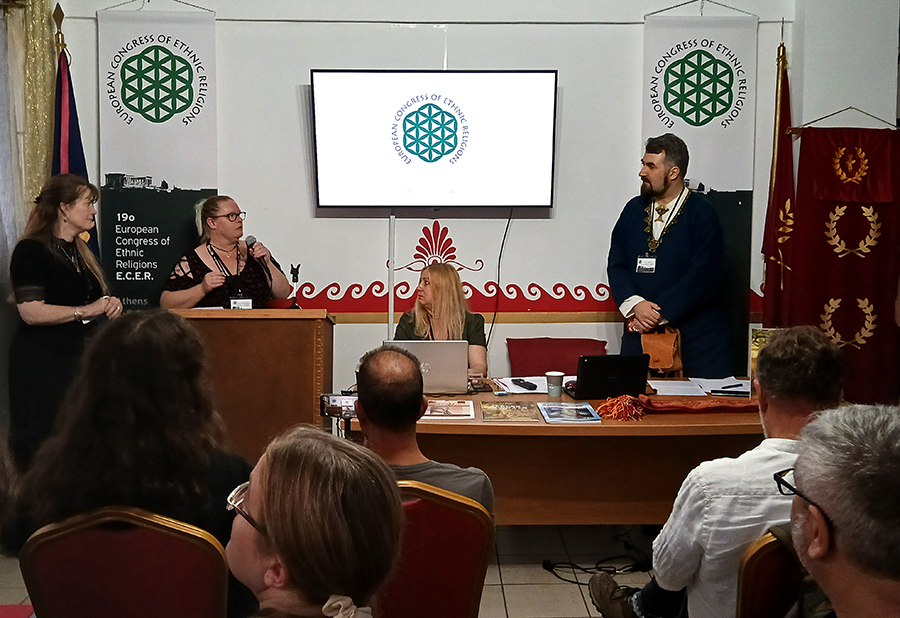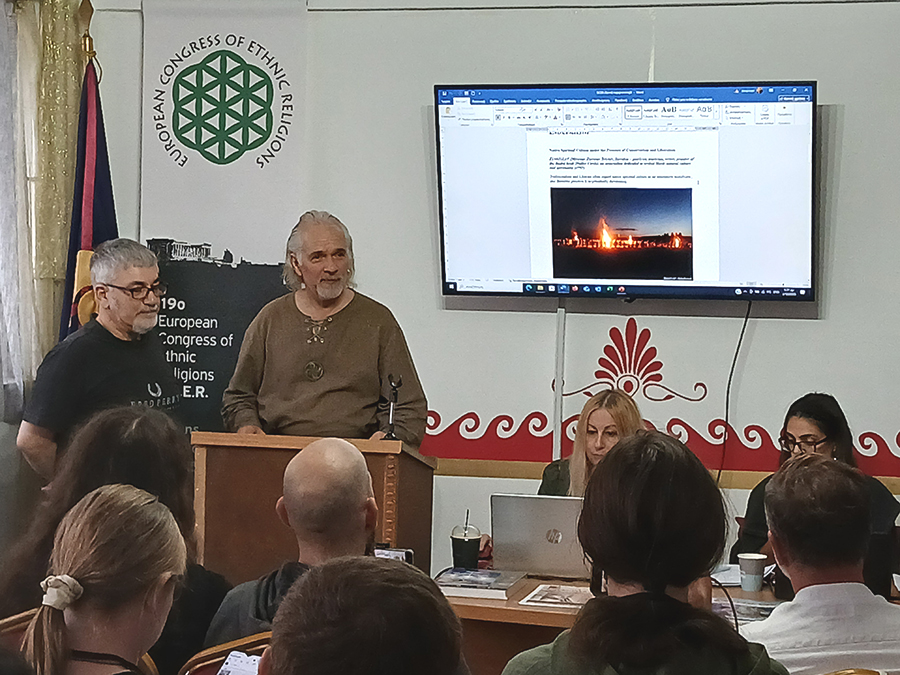THE 1st WORKING DAY WITH PRESENTATIONS OF THE 19TH EUROPEAN CONGRESS OF ETHNIC RELIGIONS (ECER) IN ATHENS

The contribution of ethnic religions to the formation of European identity
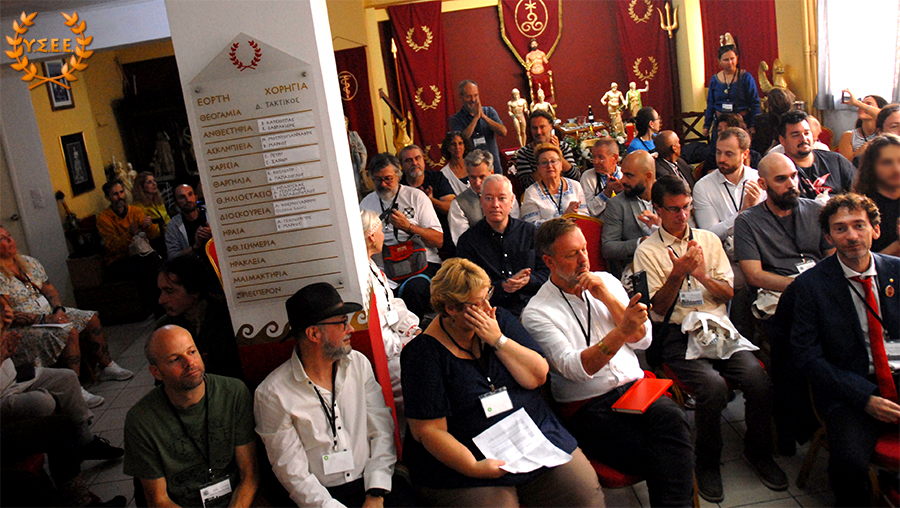
On the first day of the 19th European Congress of Ethnic Religions (ECER), presentations and speeches were given by representatives of organizations participating in the congress either as members or observers, on the main theme of the congress "The contribution of ethnic religions to the formation of European identity."
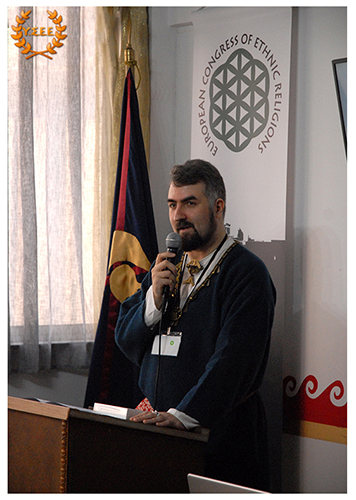 The conference officially began with an opening speech by the president of the ECER, Dr. Uģis Nastevičs, who welcomed all participants. Dr. Nastevičs, presenting the theme of the 19th conference, emphasized:
The conference officially began with an opening speech by the president of the ECER, Dr. Uģis Nastevičs, who welcomed all participants. Dr. Nastevičs, presenting the theme of the 19th conference, emphasized:
«Europe today stands at a crossroads. Across our continent, questions of identity, belonging, and values are not abstract — they touch the daily lives of communities, families, and individuals. In this context, ethnic religions face unique challenges: marginalization by dominant religions, the pressures of secularization, and the intricate task of integration in multicultural societies.
«Και τι δεν κάνατε για να με θάψετε, όμως ξεχάσατε πως ήμουν σπόρος.» “And what didn’t you do to bury me, yet you forgot that I was a seed.” — The quote from Greek poet Ντίνος Χριστιανόπουλος seems to resonate anew when considering the revival of ethnic religions across Europe. Our traditions offer gifts of immeasurable value: cultural richness, historical continuity, and a profound sense of community.»
Immediately afterwards, Koenraad Logghe and Brenda Lioris from the Traditie organisation in Belgium took the floor, whose presentation reflected the views of the pre-Christian heritage of the Netherlands. Traditie, as Brenda Lioris emphasized, «is not a reenactment group. Our organisation Traditie goes to the heart of the matter and makes it into a way of life.»
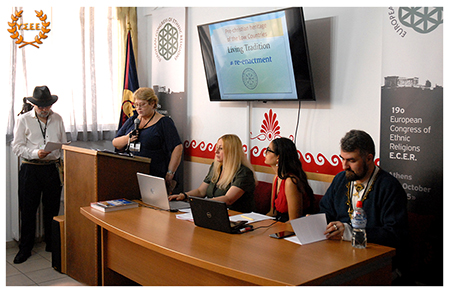 Koenraad Logghe and Brenda Lioris, among others, underlined: «Heritage is a tangible expression of this doctrine, in which everything has its place, its purpose, its fate.
Koenraad Logghe and Brenda Lioris, among others, underlined: «Heritage is a tangible expression of this doctrine, in which everything has its place, its purpose, its fate.
It is expressed in our language, stories, festivals, rituals, songs, symbols, worldview, behaviours, and character.
It is identity-forming.
Denying that doctrine is denying our nature, who we truly are.
Behind every word, behind every image, behind every symbol lies a worldview and an attitude to life.
Without that doctrine, there would be no heathenism.
"Whoever knows our spiritual vision, knows themselves. Not as a modern uprooted human, but as an authentic, upright human being.”»
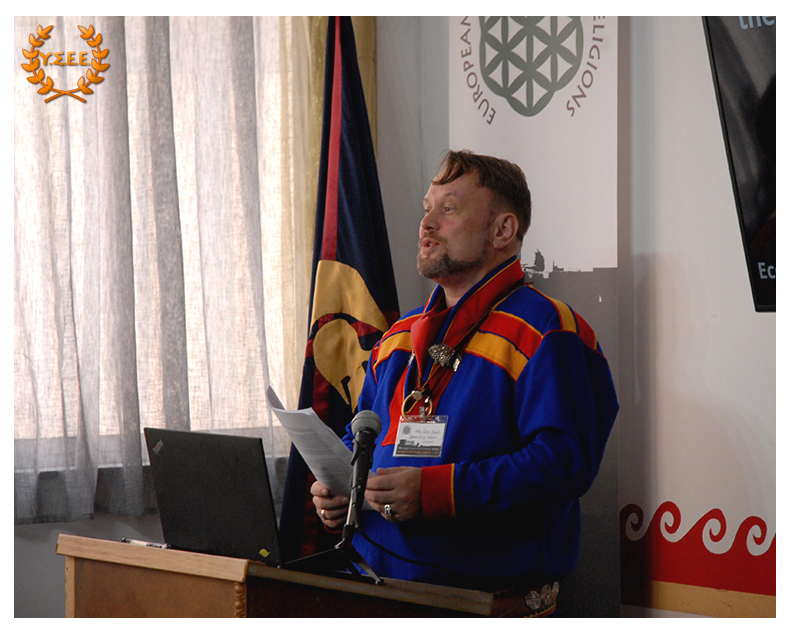 Then Kyrre Gram Franck, founder of the Sjamanistisk Forbund organization from Norway, spoke about «Aspirations for equal, open, inclusive, cohesive societies. Aspirations focus on a European identity that is pluralistic, evolving, and open to the contributions of all cultural and religious communities, especially indigenous and ethnic religious traditions. The vision is for societies that value diversity as a source of strength, ensure effective legal and ethical protections for religious and cultural minorities, and encourage intercultural dialogue. Such societies should see inclusivity, freedom of belief, and cultural diversity not as threats, but as foundational principles supporting peace, cohesion, and resilience in the region. Community contributions Ethnic religious communities, serves as pillars of community and cultural cohesion. They foster social solidarity through rituals, ethical teachings, language preservation, and collective memory. Their spiritual traditions encode knowledge of land stewardship, environmental ethics, and ancestral history, offering frameworks for coexistence and mutual respect. The resilience of these communities—despite historical suppression and ongoing challenges—demonstrates their role as living traditions that actively build societal bridges and promote cultural survival.
Then Kyrre Gram Franck, founder of the Sjamanistisk Forbund organization from Norway, spoke about «Aspirations for equal, open, inclusive, cohesive societies. Aspirations focus on a European identity that is pluralistic, evolving, and open to the contributions of all cultural and religious communities, especially indigenous and ethnic religious traditions. The vision is for societies that value diversity as a source of strength, ensure effective legal and ethical protections for religious and cultural minorities, and encourage intercultural dialogue. Such societies should see inclusivity, freedom of belief, and cultural diversity not as threats, but as foundational principles supporting peace, cohesion, and resilience in the region. Community contributions Ethnic religious communities, serves as pillars of community and cultural cohesion. They foster social solidarity through rituals, ethical teachings, language preservation, and collective memory. Their spiritual traditions encode knowledge of land stewardship, environmental ethics, and ancestral history, offering frameworks for coexistence and mutual respect. The resilience of these communities—despite historical suppression and ongoing challenges—demonstrates their role as living traditions that actively build societal bridges and promote cultural survival.
Ethnic religions have played—and continue to play—a foundational role in the formation and evolution of European identity. Their contributions as societal and identity-building forces must be acknowledged and respected. This recognition aligns with human rights frameworks committed to dignity, freedom, and cultural diversity. European identity is strongest when it embraces its pluralistic heritage, recognizing the enduring significance of indigenous and ethnic religious traditions. Only through a shared commitment to respect, inclusion, and dialogue can Europe continue to be a living tapestry of many voices, histories, and cultures.
European identity is not a singular or static essence. Rather, it is a pluralistic and evolving tapestry woven from many threads—histories, languages, peoples, and beliefs. Central to this tapestry are the ethnic religions indigenous to the continent—those spiritual systems rooted in specific peoples, lands, and ancestral traditions. These religions have formed vital pillars of community and identity, and remain integral to understanding the cultural and societal fabric of Europe.»
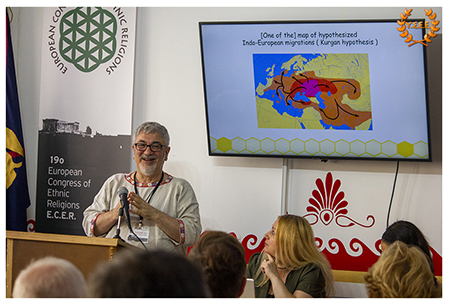 Giuseppe Maiello, representative of the Slovane organization from the Czech Republic, then expressed his concern about the lack of substantive academic study of ethnic religions and traditions, while also raising the following issue: «To what extent can Ethnic religions integrate identity and tradition within a framework that is both libertarian and anti-racist?» Then giving the answer:
Giuseppe Maiello, representative of the Slovane organization from the Czech Republic, then expressed his concern about the lack of substantive academic study of ethnic religions and traditions, while also raising the following issue: «To what extent can Ethnic religions integrate identity and tradition within a framework that is both libertarian and anti-racist?» Then giving the answer:
«Contemporary Ethnic religions may draw inspiration from local and identity-rooted folkloric traditions, without necessarily interpreting them through the lens of Indo-European theory.
The symbolic universe of the feminine, linked to moon-related mythology, has historically attracted scholarly attention extending well beyond the frameworks of Marxist or anarchist paradigms. Current ideological preconceptions, particularly in Eastern Europe, should not hinder the re-engagement with this rich and complex mythological tradition.
It is entirely possible to wear a traditional costume or a reconstructed “barbaric” outfit while exhibiting a different pigmentation. In practical terms, this does not pose any issue.»
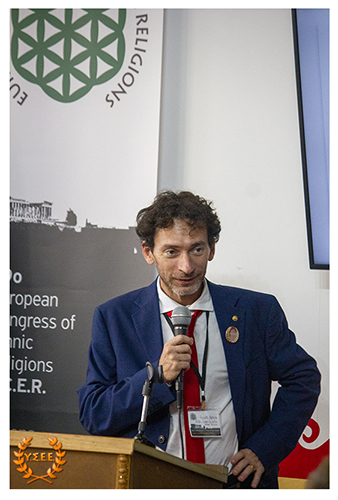 Giuseppe Barbera, Pontifex Maximus of Roman Religion and president of Pietas - Comunità Gentile, stated, among other things: «Since the rise of Christianity, there has been a tendency to argue that Socrates never existed and that he was a literary invention of Plato in order to develop, through his dialogues, the spread of his ideas. In our opinion, however, this is a Christian propaganda view, which contrasts with the idea that Socrates did indeed exist, while the Jesus Christ described by the evangelists is clearly an imaginary character, created to convey in literary form a selection of previous myths with the aim of establishing a new religious ideal that would be useful to the political unification intentions of the Roman Empire from Constantine onwards. Christianity itself therefore draws on this common European religion, and it is precisely because of this parasitism on the energy of the ancestral European tradition that Christianity was able to strengthen and establish itself. It is our intention to identify and understand the original common European religion and to draw from it the common elements that unite the different peoples of Europe».
Giuseppe Barbera, Pontifex Maximus of Roman Religion and president of Pietas - Comunità Gentile, stated, among other things: «Since the rise of Christianity, there has been a tendency to argue that Socrates never existed and that he was a literary invention of Plato in order to develop, through his dialogues, the spread of his ideas. In our opinion, however, this is a Christian propaganda view, which contrasts with the idea that Socrates did indeed exist, while the Jesus Christ described by the evangelists is clearly an imaginary character, created to convey in literary form a selection of previous myths with the aim of establishing a new religious ideal that would be useful to the political unification intentions of the Roman Empire from Constantine onwards. Christianity itself therefore draws on this common European religion, and it is precisely because of this parasitism on the energy of the ancestral European tradition that Christianity was able to strengthen and establish itself. It is our intention to identify and understand the original common European religion and to draw from it the common elements that unite the different peoples of Europe».
Jean Marc Duvette from Groupe Druidique de Gaules in France expressed his respect for the history of European traditions, emphasizing that "We are the edge of tomorrow rooted in our Traditions."
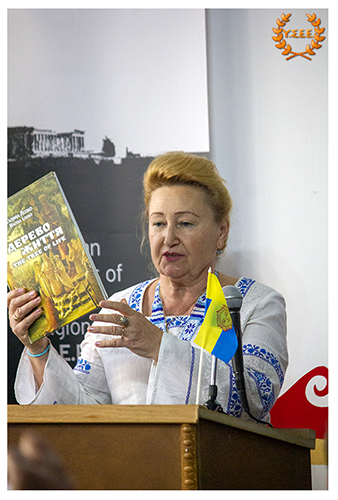 Halyna Lozko (Doctor of Sciences, professor) from Ukraine, representative of the organization "The Association of the Believers of the Ukrainian Native Faith," referred to ethnic identity in a globalized world: «The concept of “identity” means continuity, stability, and self-awareness — both individual and collective. In ancient times, identity consisted of three key elements: native land, native language, and native religion (tradition). These formed the spiritual core of a people’s existence.
Halyna Lozko (Doctor of Sciences, professor) from Ukraine, representative of the organization "The Association of the Believers of the Ukrainian Native Faith," referred to ethnic identity in a globalized world: «The concept of “identity” means continuity, stability, and self-awareness — both individual and collective. In ancient times, identity consisted of three key elements: native land, native language, and native religion (tradition). These formed the spiritual core of a people’s existence.
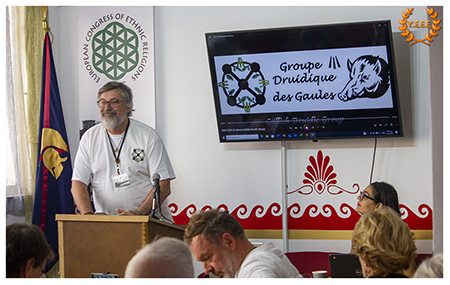 Today’s globalized world seeks to create a multicultural environment that often leads to assimilation and the erosion of ethnic identities.
Today’s globalized world seeks to create a multicultural environment that often leads to assimilation and the erosion of ethnic identities.
Universalization seeks to impose a single global religion on humanity, which would mean spiritual uniformity and the loss of ethnic roots.
That is why the revival of autochthonous ethnic religions is not just a cultural phenomenon but a strategy for protecting national identity and spiritual diversity.»
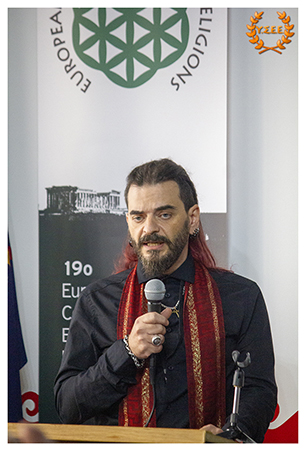 Evangelos Kiousis, priest of the Hellenic Ethnic Religion, co-founder of the House of Ethnic Hellenes Thyrsos, and member of the YSEE, stated that it is important for the organizations to meet more frequently and emphasized that: «We must define ourselves, and work hard at it, in an even more understandable language. As long as we use the tools from the same toolbox that the System provides us, in the end, we will build only a cell for ourselves and lock the door.»
Evangelos Kiousis, priest of the Hellenic Ethnic Religion, co-founder of the House of Ethnic Hellenes Thyrsos, and member of the YSEE, stated that it is important for the organizations to meet more frequently and emphasized that: «We must define ourselves, and work hard at it, in an even more understandable language. As long as we use the tools from the same toolbox that the System provides us, in the end, we will build only a cell for ourselves and lock the door.»
«We have the favor of the Goddess Fortune/Tyche to understand that we are the people of all times.
We are, the people of the "past". Who have broken the fetishistic bonds of the image.
Those who, living here and now, define the future, because we remember and experience totally the "past" by not depending on it.»
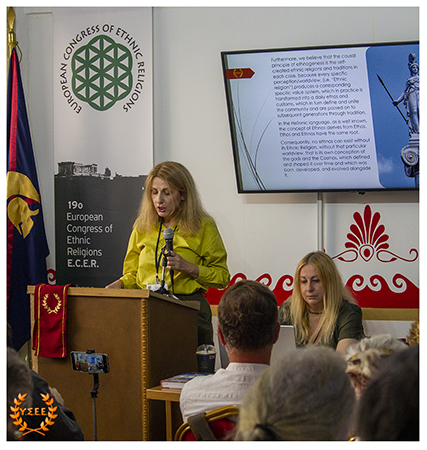 Next, Eleni Antigoni Xanthi, Priestess of the Hellenic Ethnic Religion and Member of the Board of Directors of the YSEE, stated in her presentation, among other things: «what constitutes European identity, common to all European citizens? Is it the distinctive features of a political entity such as the European Union, its institutions, the status of European citizenship that provides the possibility of free movement, residence, and work? Is it the common historical past of the peoples? Is it the sense of belonging to a specific geographical context? Is it perhaps the principles and values shared by European ethnic traditions?
Next, Eleni Antigoni Xanthi, Priestess of the Hellenic Ethnic Religion and Member of the Board of Directors of the YSEE, stated in her presentation, among other things: «what constitutes European identity, common to all European citizens? Is it the distinctive features of a political entity such as the European Union, its institutions, the status of European citizenship that provides the possibility of free movement, residence, and work? Is it the common historical past of the peoples? Is it the sense of belonging to a specific geographical context? Is it perhaps the principles and values shared by European ethnic traditions?
We modern Europeans have inherited achievements, political realities, perceptions, and traumatic experiences from the past, and we have managed to put aside our differences and reconcile, as far as possible, removing the clouds of war from European soil.
European identity does not have a commonly accepted definition. It is a dynamic concept, evolving and adapting to circumstances.
However, under no circumstances, can it be identified with Charlemagne's united Christian Europe (8th-9th centuries CE), as the European Union seems to desire.»
She concluded her speech by stating the following: «In closing this brief speech, we would like to emphasize the need for cooperation among ECER member organizations in the production of intellectual work, as well as in more practical matters. One idea we propose for consideration is the publication of an annual review, under the auspices and with the funding of ECER, which would feature selected articles highlighting ethnic traditions and theology and which could be distributed by the organizations themselves. We will not go into further detail at this time, but simply put it forward as an idea.»
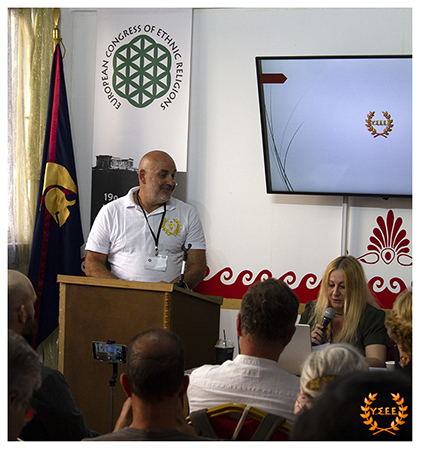 George Constantinou, president of the YSEE in Cyprus and priest of the Hellenic Ethnic Religion, said that when we talk about Europe, we often talk about economics, institutions, and politics. However, the soul of Europe is its culture – and that is where ethnic religions come in.
George Constantinou, president of the YSEE in Cyprus and priest of the Hellenic Ethnic Religion, said that when we talk about Europe, we often talk about economics, institutions, and politics. However, the soul of Europe is its culture – and that is where ethnic religions come in.
Ethnic religions are the living cells of European identity. Their contribution is not limited to historical memory, but also shapes the present, offering values, culture, and spirituality that can enrich our common European home.
The challenge we face is how to take advantage of the opportunities offered by the European Union without losing our soul, our authenticity, and our unique cultural contribution. This is the core of our journey and, at the same time, the way in which ethnic religions can strengthen and enrich European identity itself.
He went on to say that: Our strategy for the contribution of ethnic religions to the formation of European identity is based on three pillars:
1. Creative use of European and international resources for meaningful projects.
2. Strengthening cooperation between ethnic religions, based on respect and solidarity.
3. Constant vigilance against assimilation, while promoting our cultural contribution through cultural diplomacy.
These three pillars are not theoretical goals; they are our practical roadmap for the coming years.
Our path is not simply to survive within the European framework. It is to show that European unity can only be built on diversity.»
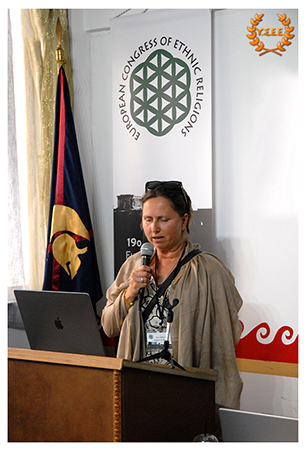 Ugnė Trinkūnaitė, from Senovės baltų religinė bendrija Romuva, Lithuania make a presentation about Romuva’s journey toward state recognition: a path marked by persistence, faith, and a deep connection to the roots of Baltic tradition.
Ugnė Trinkūnaitė, from Senovės baltų religinė bendrija Romuva, Lithuania make a presentation about Romuva’s journey toward state recognition: a path marked by persistence, faith, and a deep connection to the roots of Baltic tradition.
The year 2024 became a historic milestone: the Lithuanian Parliament reconsidered Romuva’s petition and finally granted official recognition. With this decision, Romuva achieved legal equality with other recognized faiths in the country — a moment that symbolized not only the fulfillment of a long struggle but also a symbolic victory for indigenous European spirituality. The news was celebrated across the Baltic region and within the ECER (European Congress of Ethnic Religions) networks, as a powerful sign that ancient traditions can indeed find their place in the modern European landscape.
This recognition brought tangible impacts. Vaidilos – the Romuva priests – can now perform legally valid marriages, and they are covered by the state social insurance system (SODRA). Furthermore, Romuva practitioners may soon have the opportunity to teach their religion in confessional schools, pending the approval of an official educational program. As Inija Trinkūnienė notes, recognition brings not only rights but also responsibilities.
On a cultural and social level, Romuva’s recognition reaffirms Lithuania’s enduring spiritual heritage. It encourages greater public understanding of pre-Christian traditions, strengthens ethnic identity, and fosters interfaith dialogue. Above all, it reminds us that Europe’s spiritual diversity is not merely a thing of the past — it remains alive, evolving, and deeply meaningful today.
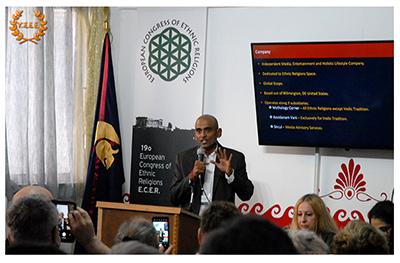 Ghanasyam Akella from Mythology Corner emphasized that «Ethnic Religions are Living Knowledge Repositories. The Correct Interpretation of an Ethnic Tradition is that of its Practitioners and Insiders. The Wisdom inherent in Ethnic Religions is essential for World Prosperity & Peace.»
Ghanasyam Akella from Mythology Corner emphasized that «Ethnic Religions are Living Knowledge Repositories. The Correct Interpretation of an Ethnic Tradition is that of its Practitioners and Insiders. The Wisdom inherent in Ethnic Religions is essential for World Prosperity & Peace.»
Mr. Akella proposed ways of using the media to publicize and promote ethnic religions.
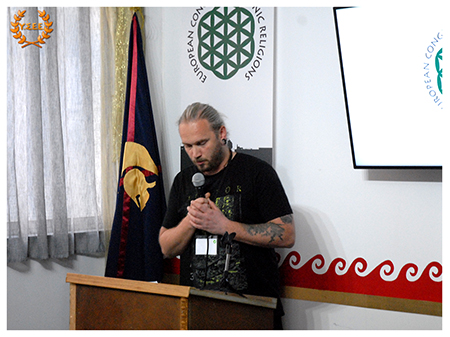 Audun Mehl from Forn Sed Norge (Norway) present the organization: «The main purpose of Forn Sed Norge is to continue old traditions and customs, as well as provide insight into and interest in Norse religion, folk beliefs and Norse cultural heritage. Since its inception, Forn Sed Norge has been both knowledge- and experience-based, and these two constitute the bedrock to this day. The faith community rests on the belief that the old ways of doing things are not a reconstruction, but have survived through folk beliefs, traditions, fairy tales, ballads and various stories. They have functioned as a vital undercurrent for the last thousand years and are now showing up on the surface again as inspiration and taking on many different forms.»
Audun Mehl from Forn Sed Norge (Norway) present the organization: «The main purpose of Forn Sed Norge is to continue old traditions and customs, as well as provide insight into and interest in Norse religion, folk beliefs and Norse cultural heritage. Since its inception, Forn Sed Norge has been both knowledge- and experience-based, and these two constitute the bedrock to this day. The faith community rests on the belief that the old ways of doing things are not a reconstruction, but have survived through folk beliefs, traditions, fairy tales, ballads and various stories. They have functioned as a vital undercurrent for the last thousand years and are now showing up on the surface again as inspiration and taking on many different forms.»
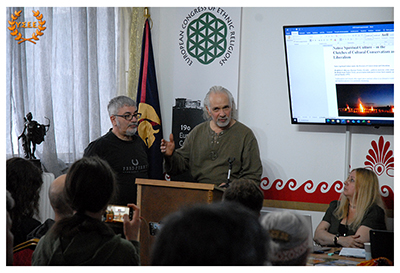 The Slovak religion was represented at the conference by members of the Rodný kruh organization.
The Slovak religion was represented at the conference by members of the Rodný kruh organization.
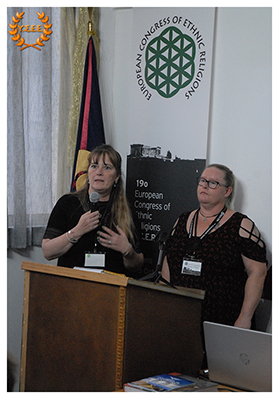 The representative of the Slovak Rodný kruh (Circle of the Fatherland) - a society for ancient natural spirituality - Miroslav Žiarislav Švický, reported on two cases of destruction of wooden statues in Slovakia (in the Kremnické vrchy mountains and in Krivany). The statues were destroyed by blows, cuts, and burns, on the grounds that they were "pagan statues." He pointed out that in Slovakia, the rights of indigenous peoples are not legally protected, that there is cultural discrimination, and, moreover, Slovak legislation is unique in the world in this respect, as it requires 166 to 5,000 times more founding members than in other EU countries for the registration of a spiritual community.
The representative of the Slovak Rodný kruh (Circle of the Fatherland) - a society for ancient natural spirituality - Miroslav Žiarislav Švický, reported on two cases of destruction of wooden statues in Slovakia (in the Kremnické vrchy mountains and in Krivany). The statues were destroyed by blows, cuts, and burns, on the grounds that they were "pagan statues." He pointed out that in Slovakia, the rights of indigenous peoples are not legally protected, that there is cultural discrimination, and, moreover, Slovak legislation is unique in the world in this respect, as it requires 166 to 5,000 times more founding members than in other EU countries for the registration of a spiritual community.
Camilla Winther Bang and Monika Ylfa Steensdatter from the Danish organization Forn Siðr deliver a welcome address at the congress. Their contribution is very important and gave the participants an insight of their tradition and their achievements towards the way of legal recognition in their country.
